




ROBERT HUGHES STUDIO



















Eljays44 Ltd, BizSpace, Courtwick Lane, Littlehampton, West Sussex, BN17 7TL Tel: 01903 777 570
EDITORIAL
Features writer – Bethany Vann bethany.vann@eljays44.com Tel: 01903 959 394
Editorial assistant – Aidan Williams aidan.williams@eljays44.com Tel: 01903 777 570
Senior subeditor – Katrina Roy katrina.roy@eljays44.com Tel: 01903 777 570
Senior designer – Kara Thomas kara.thomas@eljays44.com
Sales executive – Lewis Everle lewis.everle@eljays44.com Tel: 01903 777 588
Sales executive – Ollie Finch ollie.finch@eljays44.com Tel: 01903 777 579
Horticulture Careers – Ollie Finch ollie.finch@eljays44.com Tel: 01903 777 579
Managing director – Jamie Wilkinson jamie.wilkinson@eljays44.com Tel: 01903 777 589
Divisional director – David Griffiths david.griffiths@eljays44.com Tel: 01903 777 584
Content director – Nina Mason nina.mason@eljays44.com Tel: 01903 959 393
Commercial director – Luke Chaplin luke.chaplin@eljays44.com Tel: 01903 777 582
Subscription enquiries – Laura Harris laura.harris@eljays44.com Tel: 01903 777 575
Printed by Stephens and George Ltd
Published by ©Eljays44 Ltd – Connecting Horticulture. Pro Landscaper’s content is available for licensing overseas. Contact jamie.wilkinson@eljays44.com
Pro Landscaper is published 12 times per year by Eljays44 Ltd. The 2024 subscription price is £128. Subscription records are maintained at Eljays44 Ltd, BizSpace, Courtwick Lane, Littlehampton, West Sussex, BN17 7TL, UK. Articles and information contained in this publication are the copyright of Eljays44 Ltd and may not be reproduced in any form without the written permission of the publishers. The publishers cannot accept responsibility for loss of, or damage to, uncommissioned photographs or manuscripts.
Whilst every effort has been made to maintain the integrity of our advertisers, we accept no responsibility for any problem, complaints, or subsequent litigation arising from readers’ responses to advertisements in the magazine. We also wish to emphasise that views expressed by editorial contributors are not necessarily those of the publishers. Reproduction of any part of this magazine is strictly forbidden.
Pro Landscaper is proud to be an Accredited Supplier member of BALI
Pro Landscaper is proud to be an associate member of

It has been a whirlwind of a year – for the industry and for Pro Landscaper. Biodiversity net gain being introduced in February arguably had the biggest impact. We launched our own insight guide on the legislation at the start of the year, produced numerous features around the opportunities for the industry, and even held our own BNG Workshops Day to help understand how to ensure it is as successful as possible at each stage of the process. It was also a hot topic at our first Future of Commercial Landscaping Conference back in June.
Aside from this, we had teams competing at the Pro Landscaper and FutureScape Golf Challenge and launched Pro Landscaper on Tour, taking a group of landscapers and designers to visit Renson’s NOA Park in Belgium in what is the first of a series of trips to visit suppliers abroad.
On top of that, we hosted various award ceremonies, starting with the well-established Pro Landscaper Business Awards in April, followed by the Pro Landscaper Project Awards in July – with our hugely popular Summer Party taking place straight after – and the second ever Pro Landscaper Sustainability & Biodiversity Awards in October. Pro Landscaper’s 30 Under 30: The Next Generation awards celebrated its 10th year at FutureScape too with a special event for our 300 alumni.
As you can tell, it’s been a busy 12 months for the team – but rather than taking our foot off the accelerator, we plan to come back from the Christmas break in top gear. In the first few months alone, we’ll be taking Pro Landscaper across the pond by launching the brand in the sunshine state of California, holding our prestigious Pro Landscaper Business Awards in London, and hosting the first FutureScape Global in Saudi Arabia. And that’s just the start.
We hope you’ve had an equally exciting and prosperous year and that you’re looking ahead to 2025 with just as much energy and enthusiasm as we are.

13
Thriving Through Change
As the year draws to a close, businesses across the industry share in their successes of the last 12 months.
25
An Elite Legacy
25 years after it was established, Elite Landscapes has put a new board of directors in place to continue its success
43
Let’s Hear It From:
Mark Britton
The new managing director of The Outdoor Room is determined to maintain the company’s tight-knit culture going into its 30th year


49
Taking in the View
A contemporary garden designed by Robert Hughes Studio that fits seamlessly into the surrounding countryside
55
Swinging Success
Karl Harrison Landscapes was brought in to create a raised decking terrace but ended up redesigning the whole garden in Chorley
61
Digital Detox
Rachel Platt’s show garden at last year’s RHS Flower Show Tatton Park has been relocated to the Manchester Metropolitan University (MMU)
19
Sustainable Succession
Landscape architecture practice
Camlins is one of the latest companies to become employee owned in what is an “exciting new chapter”
67
Powering Ahead
We caught up with Mitie’s head of fleet Chris Cubberly, about the company’s steadfast transition to EVs
71
Back Garden Net Gain
As biodiversity net gain continues to find its footing, the role of private gardens in supporting local wildlife is now under scrutiny

76
Guiding the Way
James Scott explores the power of mentoring, leadership, and shaping the careers of future industry leaders
81
Challenge the Rhetoric Don’t get caught up in the wave of greenwashing, urges Peter Reader –and give legislation a chance
83
Five Minutes With: Kay Geoghegan
Pro Landscaper’s Sustainability & Biodiversity Leader of the Year on keeping B Corp Tyler Granger ahead of the curve
32
Landscape-Led Planning Reform
Ian Phillips from the Landscape Institute puts forward eight recommendations for government which put the environment first
38
Rise Above the Rest
Gareth Wilson wants the industry to take positive action to stand out amongst the cowboys, starting with educating clients
78
The Dilemma of Desperate Dan What does cow pie have to do with net zero? Chris Churchman explains how an old comic book tale has a valuable lesson





The Nurture Group has announced its 50th and largest acquisition to date with the purchase of Tivoli Group Ltd. Tivoli was the fourth largest player in grounds maintenance and landscaping sector, with an annual turnover in excess of £70m. Together, this has created a business with a combined annual revenue of £245m and the Tivoli brand will be retained and will sit alongside the other four brands in the Nurture Group.
The transferring teams will continue to serve their clients, operating as Tivoli under the Nurture Group banner alongside Nurture Landscapes, Gavin Jones, Gristwood & Toms and Nurture Pest Control.
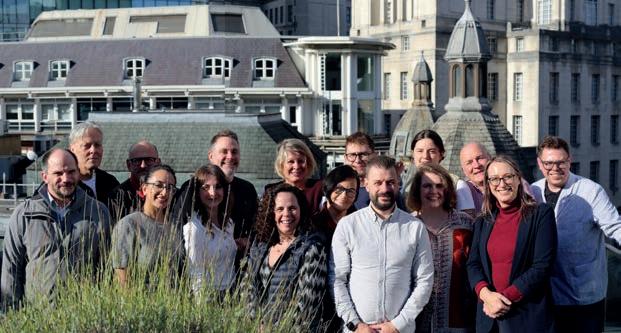
Gillespies has made a big relocation to a new studio in the heart of Manchester city centre, following 40 years in Altrincham and Hale.
The landscape architecture, masterplanning, and landscape planning consultancy firm has taken a studio on the fifth floor of Northspring, 70 Spring Gardens, with views across the city centre. The decision to relocate to Manchester was driven by the company’s desire to offer better access for its clients, co-consultants, and team.
“We’re thrilled to be in a shared workspace alongside other leading firms and look forward to taking advantage of the building’s amenities and the wider opportunities of such a central location,” says Jim Gibson, partner at Gillespies.
“Our new base deepens our long association with the city we’ve had the privilege to help shape and will enhance our ability to attract and retain creative talent, all while supporting our commitment to a more sustainable future.”
gillespies.co.uk
The acquisition follows on from several recent acquisitions completed in 2024, including arboriculture specialist Gristwood & Toms, and three grounds maintenance businesses – Roy Cowie, Spacecare and Hortech. Tivoli issued a statement on LinkedIn the following day, where it sought to reassure current customers: “We want to assure our clients that there will be no immediate changes to our service. Tivoli will continue to operate under its trusted brand, and our clients will continue to work with the same team members and contacts.”
nurture-group.co.uk
tivoliservices.com

The chancellor Rachel Reeves has released the 2024 Autumn Budget, with the Horticultural Trades Association’s (HTA) Jennifer Pheasey describing it as “a mixed picture”.
For employees on the lower rungs, the news is more positive with minimum wage rises, a boost to the national living wage and a raise to the employment allowance ceiling.
For landscaping and construction, it will be notably better, as Reeves says the government will invest £5bn to deliver its housing plan and the budget will increase the Affordable Homes Programme to £3.1bn.
Pheasey says: “The government’s commitment to housebuilding and supporting investment is welcomed. We call on new homes to come with green spaces that are designed, delivered and maintained by UK horticulture.
“This must be an opportunity to boost UK businesses. We also welcome some continued relief on retail business rates, but we repeat our ongoing request to reform and fully review rates, including for our members in Scotland.” hta.org.uk
Nick Bailey has been awarded the honour of designing the headline show garden at BBC Gardeners’ World Live 2025.
The presenter, designer, plantsman and author will create a sustainable garden that’s bursting with colour and host daily sessions from his garden, sharing tips and advice on how to garden more sustainably.
Experts from the garden’s plant supplier Hillier will be explaining how to recreate its look at home At the Let’s Talk Plants Stage in the Floral Marquee.
Lucy Tremlett, event director at organiser Immediate Live, says: “2025 is set to be
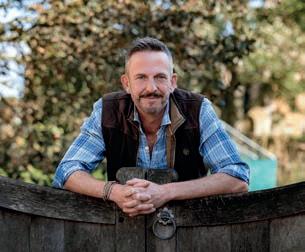
another fantastic year of BBC Gardeners’ World events, with exciting new features across all locations.
“We’re particularly thrilled to have Nick Bailey joining us at BBC Gardeners’ World Live with his inspiring garden design that champions sustainable gardening practices.”
bbcgardenersworldlive.com
Midland Metropolitan University Hospital (MMUH) has opened its doors in West Birmingham, with landscape architecture by Grant Associates playing a key role in the new design.
Grant Associates’ vision for MMUH is centred around biophilic design, connecting people with nature to support both physical and mental health. The design provides a narrative on the canalside

Pro Landscaper has published a new Biodiversity Net Gain in Practice Guide with eight recommendations for how the legislation could be better implemented going forward.
The guide has been created following a day of workshops held in London, which saw various stakeholders brought together to discuss different areas of the legislation.
location and habitats, and features expansive views onto courtyards, terraces and roof gardens to connect the building with its surroundings.
Key themes include promoting active, healthy lifestyles, encouraging biodiversity, and creating spaces that are welcoming, inclusive, and therapeutic.
“This is a landmark project for the West Midlands, offering state-of-the-art healthcare facilities within a landscape designed to foster health, wellbeing, and environmental sustainability,” says Peter Chmiel, director at Grant Associates.
“We’re very proud to have played our part in designing an environment where nature is very much at the heart of modern healthcare.”
grant-associates.uk.com


WOODLAND GROW’S DANIEL IDDON
“THIS IS HOW NATURE WORKS”
Daniel Iddon says approaches to planting need to change, adding that his approach is fundamental; it’s about how nature works, as he explains how his Woodland Grow Fertiliser works.


HOMEGROWN TALENT: ARCHITECTURAL PLANTS’ ANSWER TO THE SKILLS SHORTAGE
There’s been talk of a skills shortage for years. Whilst there are plenty of roles, there just aren’t enough people. But Architectural Plants is having the opposite problem.


30 UNDER 30 – A CATCH UP WITH TAYLOR GEE
Following a year of growth for Design Only Gardens, director and founder Taylor Gee is keen to keep the success going with the launch of a website that he hopes will become a “valuable content hub” for designers and landscapers.
“We developed the BNG Workshops Day because we recognised that the introduction of BNG legislation offered an opportunity for the industry to offer influence, demonstrate value, and shape projects at earlier stages. To enable this, there needed to be new levels of collaboration and connection, and to also look at how we bridged knowledge gaps," says David Griffiths, divisional director at Eljays44.
“It was great to be able to bring key stakeholders together and witness the collaboration which has helped shape this guide. To realise the opportunity for our industry, these conversations need to carry on and we see Pro Landscaper playing a pivotal role in enabling this.”
To download the latest Biodiversity Net Gain in Practice Guide, scan the QR code:






In a year marked by uncertainty and progress, it is safe to say the industry has been rife with change as of late. Let’s take a look back at the defining moments of 2024 .

WILLERBY LANDSCAPES BREAKS RECORD WITH LATEST BIG WIN AT NATIONAL LANDSCAPE AWARDS
The Edenbridgebased company secures its seventh Grand Award at the British Association of Landscape Industries National Landscape Awards, in association with Green-tech, for its work on the Battersea Power Station Phase 2 Roof Garden, which is part of the 43-acre Grade II listed site’s flagship regeneration scheme.

LANDMARK NATURE LEGISLATION LAUNCHES TO TACKLE BIODIVERSITY LOSS
After over a decade in the making, biodiversity net gain rolls out across England for all new major developments, bringing into effect a mandatory 10% uplift of a site’s existing nature baseline and a minimum 30 year maintenance clause.

THE LANDSCAPE INSTITUTE AND BALI LAUNCH NEW COLLABORATIVE CARBON REDUCTION REPORT
The Landscape and Carbon report launches as a direct response to the UK’s ambition to achieve net zero, data shared within shows urgent action is needed for a chance to hit the 2050 target. The report also highlights how best the industry can contribute to the reduction of carbon emissions in developments.


INDUSTRY DIVERSITY BROUGHT INTO QUESTION BY NEW EQUALITY, DIVERSITY AND INCLUSION SURVEY
Results of the ED&I survey reveals that just 12% of the industry is aged between 25-34, with 16-24-year-olds making up a staggeringly lower 3%. Results also show that only either 1% or less than 1% of respondents were not White or British. Ultimately prompting the question; how diverse is the horticulture industry?

This year’s recipient of the Society of Garden Designer’s Lifetime Achievement Award has been gifted to horticulturist and author, James Hitchmough for his continued dedication to the sector.

TYLER GRANGE ANNOUNCES NEW MANAGING DIRECTOR

Co-founder Jon Berry has been appointed managing director of Tyler Grange. The environmental consultancy has also gone on to be named one of The Best Places to Work by the Sunday Times, as well as receiving its Living Wage Employer accreditation from the Living Wage Foundation since then.

NEW MANAGING DIRECTOR ANNOUNCED FOR FROSTS LANDSCAPE CONSTRUCTION
Alistair Bayford takes over from Ken White as managing director of Frosts Landscape. The change in leadership comes as the commercial landscaping company transitions to an Employee Ownership Trust.

“LANDMARK” UNIVERSITY MERGER TAKES PLACE BETWEEN WRITTLE COLLEGE AND ANGLIA RUSKIN
Land-based education provider Writtle University College merges with Anglia Ruskin University (ARU). Under its new name, ARU Writtle, it will continue to provide its full range of land-based degree courses, as well as offering its existing courses for 16-18-yearolds and adult learners, a specialist Further Education college called Writtle College has been established.

LEGISLATION EXTENDS TO SMALL SITES
Under Schedule 7A of the Town and Country Planning Act 1990, developers are now required to deliver the 10% mandatory uplift on all small developments, unless otherwise exempt.


Malcolm Catlin is appointed the new project director for Plant Healthy, he will oversee the progress of the certification scheme and the Plant Health Management Standard, while working closely with Defra and other partner organisations from the Plant Health Alliance in his new role to promote and enhance plant health and biosecurity measures.

CHANGE TO PLANT IMPORTS SET TO IMPACT LANDSCAPING INDUSTRY

All plants being brought into the UK will now need to do so via a Border Control Post (BCP), the latest stage of the government’s Border Target Operating Model – bringing with it expected price hikes. Off the back of this, Provender Nurseries has become the first trade supplier to have a Control Point. This means a faster, smoother transition of plant imports, reduced costs and therefore cost saving for customers at Provender, says Stuart Tickner, head of nursery, biosecurity and production.
RHS REVEALS WINNER OF CHELSEA’S FIRST GREEN AWARD
The World Child Cancer Nurturing Garden wins the inaugural Environmental Innovation Award at this year’s RHS Chelsea Flower Show. Meanwhile designer Ula Maria marks her RHS Chelsea debut with a Best in Show win for her The Muscular Dystrophy UK – Forest Bathing Garden, built by Crocus, which has announced that after 22 years it will be stepping back from the show. In another first for the May show, Ann-Marie Powell’s The Octavia Hill Garden, built by The Landscaping Consultants, wins the inaugural Children’s Choice Award. His Majesty King Charles III was also in attendance at the show after being named the next patron of the RHS.


NATURAL HISTORY MUSEUM UNVEILS NEW URBAN GARDENS
Wrapping around the five-acre space, the Natural History Museum opens its new large-scale outdoor garden in support of urban nature, complete with a new diplodocus dinosaur made entirely of bronze. The space, which aims to showcase 2.7 billion years of history through plants, geology, and wildlife, now features a Jurassic garden, living laboratory and evolution timeline.


RHS HAMPTON COURT 2024: TOP AWARDS
Accolades for the 2024 RHS Hampton Court Palace Garden Festival are revealed. The awards for Best Show Garden and RHS Environmental Innovation went to Juliet Sargeant’s The Lion King Anniversary Garden. Nic Howard’s Exodus Adventure Travels: The Sounds of Adventure Garden took home the award for Best Construction (Show Garden), while the awards for Best Get Started Garden and Best Construction (Get Started Garden) went to The Mediterraneo Garden designed by Katerina Kantalis, and Best Resilient Pocket Planting went to the Winds of Change Garden by James Miller, Marko Yau and Saachi Parasrampuria. People’s Choice Awards went to The Way Of Saint James (Show Garden), designed by Nilufer Danis, The Making Sense Garden (Get Started Garden) designed by Flora Scouarnec and Victoria Pease-Cox, and The Moonshadow Moth Garden (Pocket Planting) designed by Sarah Mayfield.


The Eden Project names Andy Jasper, formerly of the National Trust, as its new group chief executive officer, replacing Rob Chatwin. This will be Jasper’s second stint at the Eden Project, having previously spent 13 years as the Project’s head of research and evaluation.

Garden designer and Pro Landscaper’s 30 Under 30: The Next Generation winner, Harry Holding embarks on his latest venture. LDN Horticulture, which is partnered with sister company Harry Holding Studio, will provide sustainable after care and garden maintenance services across London.

Former RHS Wisley curator, Matthew Pottage has been appointed as head of horticulture and landscape strategy for the Royal Parks. He will oversee upcoming restoration projects across the city, while still retaining his position as trustee of Fulham Palace.


The 25th rendition of RHS Flower Show Tatton Park sees the inaugural winner of the new award category, RHS Career Changer of the Year – created specifically for new entrants aged 31 and over –announced. Former police officer, Chris Reynolds scooped the award for his The Safe Space Garden, while former Young Designer finalist Ollie Pike took home the win for Best Show Garden with his design, This Garden Isn’t Finished Without You. RHS Tatton will not be returning to the Cheshire site until 2027, instead a 2025 RHS Show at Wentworth Woodhouse, South Yorkshire and a 2026 RHS Show in Sandringham will take its place.

LANDFORM CONSULTANTS
TO LAUNCH A NEW COLLABORATIVE VENTURE
When you’ve built as many show gardens as Landform Consultants, you’re bound to have built up a collection of relics. Then there are the items salvaged from creating various landscapes. These have all been stored at the company’s site in Chobham, Surrey – but they’re about to be given a second life with the launch of the Glasshouse Collective.

BLAKEDOWN LANDSCAPES APPOINTS
CHRIS WELLBELOVE AS MANAGING DIRECTOR

Chris Wellbelove has ascended through the ranks of Blakedown Landscapes over the past 15-years and has now been named new managing director. He takes over from Steve Buckingham and is poised to lead the company forward in its future growth.

FLAGSHIP GREENWICH PARK PROJECT REACHES COMPLETION

After four years, The Royal Parks has completed its restoration of Greenwich Park – a project aptly named Greenwich Park Revealed. Several original features from the 17th-century landscape have been restored and enhanced to safeguard them for future generations, including the ‘Grand Ascent’ – giant grass terraces that were originally established in the 1660s. Multiple facilities have also been erected to encourage a stronger connection between the community and the historic site.
ADRIAN WICKHAM AS NEW NATIONAL CHAIR
The British Association of Landscape Industries (BALI) appoints Glendale’s managing director, Adrian Wickham as new national chair –he succeeds Tessa Johnstone. While Matt Nokes, Alistair Bayford, Mark Gregory, Kersten Catella, Paul Lynch, and David Twist take up their new positions as vice-chair and board directors respectively.

ISG has ceased operation with immediate effect as the construction specialist heads into administration after several buy-outs fall through. In an email sent to all staff, chief executive Zoe Price points towards lasting repercussions from loss-making contracts between 2018 - 2020 as part of the reason for this decision.

The winners of this year’s Pro Landscaper 30 Under 30: The Next Generation, in association with Green-tech, join the ranks of 270 existing alumni, bringing the total number of those recognised to 300. The class of 2024 collected their awards at a ceremony held at FutureScape, which also saw Ross Conquest – fellow 30 Under 30 alumni – host two exclusive panels.


David Strows of Artform Landscapes takes up the mantle of chair for the Association of Professional Landscapers (APL) – he succeeds Holly Youde in the role while Chris Stone is appointed as new vice chair.

Kim Morrish has stepped down from her role as a non-executive board member at Ground Control after 20 years. She also leaves her role as lead of Ground Control’s Evergreen Fund. She initially led the search for and subsequent acquisition of Ground Control, alongside her husband.

British Sugar TOPSOIL enters into an exclusive distribution agreement with Boughton Loam which will see the latter take over all Topsoil sales and marketing operations for British Sugar and become the exclusive route to market for the Topsoil product range.


The National Trust appoints Sheila Das as new head of gardens and parks – she succeeds Andy Jasper who stepped down from the role in September. For the last nine years, Das has worked as garden manager for RHS Garden Wisley, during which time she has been instrumental in establishing Wisley’s PlanetFriendly Gardening Campaign to increase biodiversity and facilitating environmental stewardship – she is well known for being committed to soil health.


Nurture Group marks its 50th and largest acquisition to date with the purchase of grounds maintenance company, Tivoli. The Tivoli brand will be retained and will sit alongside the other four brands in the Nurture Group. Today more than half of those employed by Nurture joined the organisation via acquisition, including several in senior leadership positions.

MIDNIGHT
Forma Composite
Slatted Cladding

SUSTAINABLY PRODUCED TIMBER ALTERNATIVES THAT ELEVATE YOUR OUTDOOR SPACE
Low maintenance, guaranteed quality, exceptional design.
Ecoscape UK is a manufacturer of long lasting, low maintenance timber alternatives. We boast the largest collection of wood plastic composites on the market and aim to be at the forefront of the industry through innovation and continually developing products of the highest standard. Contact us today to speak to our team of composite experts.



“Wyevale Nurseries began work on constructing a reservoir/water conservation system at our Container Tree production site to help boost our annual water management targets within our ongoing sustainability plans. The project will reduce abstraction from boreholes, recycle more water, help alleviate flooding for the local community and provide a vital habitat for aquatic wildlife. Planting native hedging species, lowland wildflower meadows and the provision of nesting facilities will support all other wildlife as part of our environmental targets.”
Andy Johnson, managing director wyevalenurseries.co.uk
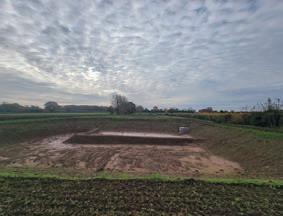




“This year, Beechwood Trees and Landscapes achieved a significant milestone by expanding our management team to 10 departmental managers. This strategic move, including the promotion of James Mouslety to senior team leader, has strengthened our technical operations and enhanced our capacity to deliver exceptional service across the Midlands.”




Simon Rotheram, managing director beechwoodtrees.co.uk
As the year draws to a close, businesses across the industry share in their successes of the last 12 months
“One of our highlights from 2024 is the success of our project, “Our Happy Place” (pictured right) built in collaboration with Adam Vetere Garden Design. Overall, the project has won three National Landscape Awards, a Pro Landscape Project Award, and has been announced as a Finalist in three categories at the APL awards. We are extremely proud of these achievements and it’s a true testament to the team’s dedication and hard work to delivering quality gardens.”
Justin Himpson, director jjhlandscapes.co.uk




“What a whirlwind year 2024 has been for me!
Presenting two slots on the new ITV

Alan Titchmarsh’s Garden Club show, as the garden design expert; winning the Planting Design award at the Pro Landscaper Project Awards; working for Disney on a social media campaign to promote the new Deadpool & Wolverine film; my new partnership with Crocus; designing a portable lighting range with Hudson Lighting; plus speaking at FutureScape. It’s fair to say my feet haven’t touched the ground. Here’s to a cracking 2025!”
Lucy Wilcox, owner lucywillcoxgardendesign.com
BLAKEDOWN LANDSCAPES landscapes.

“2024 has been a successful year for Blakedown Landscapes, marked by winning and delivering large complex park restorations, highquality public realm projects, and iconic gardens. Highlights include Greenwich Park Revealed and The Oudolf Landscape

at RHS Garden Wisley, both BALI National Award winners. I myself was appointed as managing director this year, and we further strengthened our leadership team with the appointment of a design project manager.”
Chris Wellbelove, managing director blakedown.co.uk
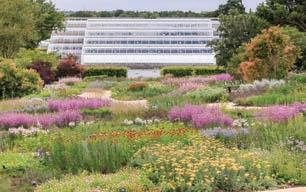
“Being asked to select just one business highlight from 2024 is incredibly challenging. From taking home a highly respectable Medium Business of the Year award to exhibiting at several industry events, the last year has been filled with key achievements we’re immensely proud of. We’ve ended the year on a high by launching



several new solutions for our customers. As we look ahead to 2025, we have more passion for our craft than ever before.”
Stuart Dantzic, managing director cbsolarshading.co.uk
"The highlight for Green-tech in 2024 was raising an outstanding £31k for charity as part of our 30th-anniversary celebrations. Supporting five meaningful causes, this achievement demonstrates the team's unwavering commitment to giving back and making a difference. Each charity received £6,200, highlighting Green-tech's passion for creating positive change and the lengths the team went to raise such a phenomenal amount. I’m proud to reinforce Green-tech’s legacy as an industry and community leader.”





Kris Nellist, managing director green-tech.co.uk
“We’ve been working on an exciting project to transform Churton Hall Farm, one of Cheshire’s oldest buildings and part of the Barnston Estate, which traces its history back to the Norman Conquest. We’ve worked with the Estate for a number of years (including on a natural burial ground and a holiday cottage) and on this project we’re involved with the landscape design and access. Plans have recently been submitted to sensitively restore and develop Churton Hall Farm into residential dwellings, a community hub for local residents and a care farm.”
Simon Richards, director landstudio-uk.com



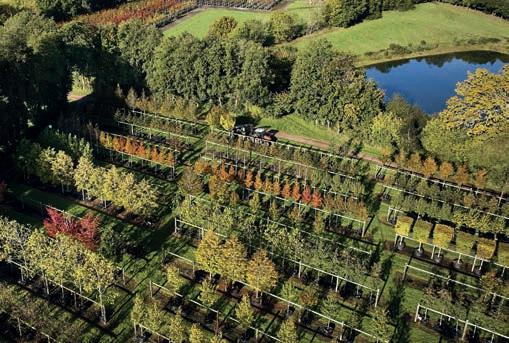
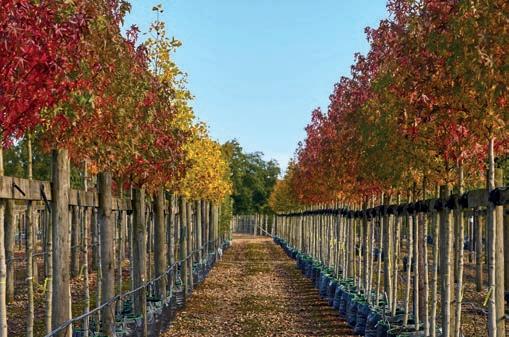
Established 1864
As sustainability becomes increasingly important, the role of trees in combatting climate change, supporting bodiversity, and improving the environment has never been clearer.
Ready to make a sustainable choice? Get in touch to discover our British-grown trees for your project!




trees.hillier.co.uk


treesales@hillier.co.uk 01794 368 733
Download The Hillier Tree Guide
Your guide to our range of trees. Showing their form and size over 15, 25 and 50 years, plus helpful information on suggested usage for a variety of projects and locations.
Scan this QR code to download your copy today!
Hillier Trees: Supplying the landscaping industry for 160 years.



Newly appointed chair Dave Strows discusses the role as well as upcoming plans for the Association of Professional

Congratulations on becoming the APL chair. How did it feel when you first found out?
Thank you. Of course, it's an absolute honour to follow in the footsteps of those who have carried out the role before me. Although during my tenure as vice chair, I knew that the natural progression was to become chair, I was suddenly very aware of the extremely large boots I was stepping into, as Holly Youde was exceptional in the role.
The announcement was made during the annual APL meeting at FutureScape. It was bittersweet, as we were also seeing Holly step down. I have been very lucky to be able to work alongside her and learn so much from her, and she has achieved so much in her time as chair.
What are the main goals you’re aiming to achieve during your tenure as chair?
thanks to a team of dedicated and talented individuals who form the committee, and to the invaluable engagement of our members, we are constantly evolving and improving as an association and community.
In addition to that, we’re maintaining and developing the initiatives that have been introduced by previous chairs and the APL committee. A main point of focus is the introduction of British Standards to our members and the wider industry. Having spent three decades in this field, I have always held a strong belief that, in order for our industry to be perceived as a profession rather than a trade, we must step up and have a benchmark by which we are held accountable. For a number of years, I have had the enormous pleasure and honour of working alongside some extremely knowledgeable and inspiring professionals to contribute towards the formation of the new paving standard, and I am very much looking forward to working with our members and the wider industry to help them integrate it into their working practice.
The APL celebrates its 30th anniversary next year and we are busy planning events to reflect the momentous occasion
Well, firstly, I must say that everything that is achieved by the APL is due to a massive team effort. We work closely with our members to focus on the issues that are of concern to them. It’s no small task, and
Education is another passion of mine, and I believe that the introduction of the standard offers an opportunity for the wider industry to unite around a single source of specification and use it to develop a fit-for-purpose route of learning for our industry. For many years, the landscaping community has had to source nuggets of information from many sources, both good and bad, and this
approach is not conducive with presenting landscaping as a professional vocation. The outcome of which would go a long way to solving some of the issues faced by our industry such as encouraging young people into our industry, aiding diversity, building more sustainable and bio-diverse gardens, and distinguishing ourselves from the “do-it-all-jobbers”.
From experience, I’m aware these things take time, perseverance, belief and like-minded people to succeed, but I am always optimistic, and the APL is incredibly supportive and driven to improve our industry.
Are there any future plans in the pipeline that you can discuss?
There are always plans in the pipeline; there are many new initiatives currently being developed as well as collaborations with other organisations. Some that I can mention are that the APL has been working with Neil Stead of Steady Consulting to formulate its Business Development Programme, which will be available to members and non-members next year. It’s a modular course and covers all aspects of business – from creating your purpose to planning your exit. We are currently inviting interested parties to contact the APL for more details.
not yet members. Being a part of the committee also requires a time and focus commitment and this means that there will always be a natural ebb and flow as people’s priorities change in their personal lives. It’s all a part of the process and one I’ve experienced several times during my time as a committee member.
All of the previous committees have been fantastic, and I have to say that I feel the current committee is exceptional and more diverse and representative than it has ever been.
The beauty of the APL community is that everyone wants to help everyone else succeed which inspires confidence and makes it so enjoyable to be a part of
We will also be providing CPD, educational seminars and content for our members with the support of David Burton, the chair of the British Standards 7533 committee, to introduce them to the new paving standard. This will also incorporate sustainability in relation to specification and construction techniques.
And of course, the APL celebrates its 30th anniversary next year and we are busy planning events to reflect the momentous occasion. So, it will be a lot of hard work but also a lot of fun.
You’ll be working alongside Chris Stone, having been in his position prior to this. What has been your advice to him so far?
I am so very lucky to have Chris as vice chair. Chris is a very successful, well respected and much-admired member of the community and I am positive that he does not need any advice from me – except perhaps that, as a fellow flat-cap wearer, he should check in with me before special occasions to make sure our wardrobes don’t clash.
It seems to have been a really busy time for the APL at a management level, with board members joining and some stepping down. It’s important to keep evolving. The committee must be reflective of the membership and to a degree, those who are
How does it feel working with APL general manager Phil Tremayne at a slightly higher level?
What can I say that has not already been said about Phil? We all know he is the hardestworking person in the industry; he is a constant upon which the APL and the wider industry can rely on to be honest, diligent, straight-talking, unflinching, considered, balanced, kind, generous and incredibly dedicated to helping this industry and all those inside it succeed.
I have had the absolute privilege of knowing and working with him for many years and, like many others, if it were not for Phil’s encouragement and support, I would not have had the opportunity to grow as a person and as a business.
We don’t always agree on things, and that is healthy; you need different points of view to create a balanced approach. But what you also need is respect for each other’s opinions, and that is something that we share.
We’re speaking not far off a month since you started –what has the first month of the role been like?
To be honest, it has been very enjoyable. The support from Phil, Holly, Chris and the committee have made the transition seamless, and far less stressful than one might imagine. The beauty of the APL community is that everyone wants to help everyone else succeed which inspires confidence and makes it so enjoyable to be a part of.
Of course, there is work to be done, and the honeymoon period is well and truly over. So, it’s now full steam ahead and I look forward to the next three years.









KönigOutdoor is a British manufacturer of outdoor kitchen cabinetry, made to the highest specification, using sintered stone external surfaces to provide a high-end finish with extreme durability.
Each KönigOutdoor kitchen is made to order with turnkey advice and support available for you and your client, from design through to aftercare.
Shrewsbury-based landscape architects practice Camlins safeguards future and targets market growth by becoming 100% employee owned

In recent years, the UK business landscape has experienced a significant shift in the rise of Employee Ownership Trusts (EOTs); by offering a magnitude of employee-focused benefits, it is arguably one of the more sustainable succession plans on the current market.
Camlins, a landscape architecture practice in the heart of Shrewsbury, is the latest to undergo the transformation with the intention of safeguarding its independence, while retaining its team of top talent.
Landscape architect and Camlins director, Paul Shirley Smith delves into what comes next for the practice under the new ownership structure. Shirley Smith, who first began working with Robert Camlin as a student in the 1980s before taking on the role of director in 1999, says his own multi-decade commitment to the practice contributed to the decision-making process.
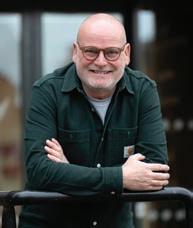
“We have been considering what a future ownership model for the practice might look like for some time and felt that employee ownership offered the best opportunity to continue building on everything that the practice has achieved
up to this point in a sustainable way.”
The main goal behind this shift is to “ensure Camlins’ long-term independence”, while being able to “maintain the practice culture that has consistently delivered for so many years”, says Shirley Smith, who believes that by instilling an increased sense of ownership across the team “can only deliver even greater benefits for both the practice and its employees.”

The aspirations don’t stop there though; Camlins is committed to “continuing to grow as a practice, embracing new market opportunities and to be at the forefront of addressing the environmental challenges facing society.” Shirley Smith believes to do that “requires an environment that is empowering, encourages independent thought and celebrates



innovation and entrepreneurialism”, something he feels is well within reach under employee ownership and an expanded leadership team. Existing financial director, Becki Davies, as well as new directors Andrew Nicholson and Mark Dunn, and Shirley Smith himself will be heading up the leadership team, which will work in tandem with the appointed trustees and chair managing the EOT. “They will have a key role in acting as the eyes, ears and voice of the employees, working with the leadership team in achieving our joint aspirations for the practice.”
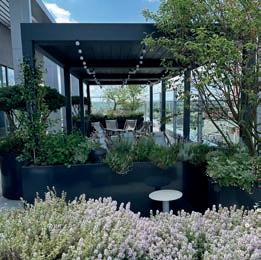
Under the EOT business model, employees will be encouraged to identify and report on ways of improving the business – “this could be ways of communicating better, finding cost savings, improving processes or embracing new opportunities.” And while Camlins has a “long-standing culture of collaboration and communication,” this transition to the EOT has created a more “formal channel for these important conversations to take place” – and Shirley Smith believes this shift will instil confidence among the team and support practice’s recruitment and retention strategy.
To ease its transition, Camlins worked with EOT solutions provider and specialist, Co-ownership Solutions, for both technical and employee training support. “They have been working with the whole team in helping them understand what an EOT would look like for them, with a particular focus on supporting the EOT trustees to prepare for their new roles.”
While there will be little noticeable changes on a day-to-day basis for employees, there will be “clear benefits for all employees”, says Shirley Smith. "An important part of transitioning to become an EOT is that employees share in the rewards of the practice’s success.”
An important part of transitioning to become an EOT is that employees share in the rewards of the practice’s success
He adds that by “retaining our independence, our colleagues have the security to be able to look forward with confidence that they are helping to build a practice that has no need or desire to be sold in the future – and that they will share in any future success.”
The Shrewsbury-based practice, which can trace its roots back almost half a century, is already accredited with success, particularly for its leading involvement on the delivery of one of Europe’s largest regeneration projects – London’s Nine Elms, a residential-led, mixed use scheme and linear park. This project has turned the Nine Elms area into one of London’s greenest districts to date. Building on its ongoing project success, Shirley Smith notes that the foremost impact on the practice’s growth and investment strategies is “the fact that we are now able to look to the future with the confidence that comes from creating a business model that is sustainable for the long term.”
On the horizon for Camlins is its continued work on several large-scale urban regeneration projects as well as Velindre Cancer Centre in Cardiff, Wales which is on track to become the UK’s greenest hospital – a brief that is no small feat but Shirley Smith is confident the practice’s shift to an EOT will only help expand Camlins’ cross-sector expertise.
He says that the “hugely talented and inspirational team at Camlins” and the new, “more resilient” leadership structure have “clear vision for a future that is committed to growing”, both its team and the markets in which they operate. “This transition is a real enabler for us to realise that vision and create an exciting new chapter in the Camlins story.” camlins.com























To see our full range of balustrade systems visit: www.s3i.co.uk or contact us
To see our full range of balustrade systems
e: info@s3i.co.uk t: 01302 752 504
Langdale Landscapes integrated sleek stainless steel railings and glass balustrade systems to elevated terraces complete with lush greenery to create an inviting modern outdoor space. As a longstanding customer of S3i Group the team at Langdale were confident that the chosen Q-railing products would meet their expectations to create a long-lasting, high quality finish providing not only safety but aesthetic appeal.
"We installed custom balustrades for this project, using the high-quality Q-railing Q-line post and rail system which included both cable and glass infill options. They were made to our specification from technical drawings produced by S3i. Partnering with S3i allowed us to deliver a tailored solution that perfectly fits this complex project. We have also used the Q-railing frameless glass system on other projects which is proving to be a popular choice by our customers."
- Nik Edser, Founder and Managing Director of Langdale Landscapes
Elite Landscapes is marking a quarter of a century since it was established with a new and ambitious board of directors

When his dog ate a cheque for £20,000, Dave Twist thought that was the end of Elite Landscapes. Fortunately, it’s become a funny anecdote in what is an impressive success story for the commercial landscaping company, which is now celebrating 25 years of success and an exciting shift in its management structure.
As of October, founder Dave Twist transitioned to the role of CEO, paving the way for Oscar Sorabjee as the new managing director. Three other directors have also joined the board to help continue and build on its legacy.
Elite Landscapes now has a turnover of more than £35m and has become one of the most reputable hard and soft landscaping
providers in the sector. It has grown significantly since Dave and Diana Twist founded it at their dining room table in late 1999. And perhaps surprisingly, they initially started out offering a solely domestic design and build service, funding the jobs through deposits, with no overdraft and no capital.
“It was a true family business in those days as the kids volunteered to leaflet drop the wealthier local roads; this was very effective and was crucial in setting up the business in the early days. We established a good reputation in the area and probably did domestic design and build work for about two or three years,” says Twist.
But he knew various landscape architects from his career up to that point who could help steer Elite towards the commercial
NOVEMBER 1999
Dave and Diana Twist registered Elite Landscapes Ltd, undertaking consultancy and locally generated garden design and build work.
sector. Having completed an apprenticeship at RHS Garden Wisley, Twist had gone on to study at Askham Bryan College and then gained an MHort qualification from Writtle College. From there, he worked for the Royal Parks followed by Maidstone Borough Council before spending two years landscaping in Riyadh, Saudi Arabia.
When he returned, he ran his own business in Burton upon Trent, then worked for Glendale, the Royal Parks, Cagney Construction, and Landform Consultants before once again going out on his own.
The first commercial job Elite Landscapes priced was for Queen Elizabeth Hospital in Greenwich at £20k, but the pivotal project was being asked by a landscape architect to carry out snagging at Imperial
MAY 2000
First commercial contract - £40k - undertaken for Kvaerner Construction at Queen Elizabeth Hospital in Greenwich.
Number of sites
Over 25,000 trees planted

1
million plants
Wharf for St George. “This collaboration with St George paved the way for a long-standing relationship with the Berkeley Group, culminating in 20 years of continuous development at sites like Chelsea Creek near Imperial Wharf. It is a testament to the strong relationships we've built with our clients over the years,” Twist reflects.
There are members on the Berkeley board of directors who Twist would have worked for more than two decades. It’s a journey which he says would perhaps be more challenging now. "It would be extremely difficult for people to set up a business like ours nowadays.”
After all, it’s those relationships which have formed the foundation of Elite, allowing it to work on prolific housing developments across London including Royal Wharf, Kidbrooke Village, Battersea Reach and Royal Arsenal Riverside , and many more.
“We filled a gap in the market; we could provide the whole service, and we always have done,” says Twist. “Because I was soft landscape trained in the first place, we were significantly different – we were a commercial landscape company with soft landscape experience.”
It's a testament to the strong relationships we've built with our clients over the years
“We have people who are in front of these clients on a daily basis, and who have been in front of these clients for more than 10 years,” adds Sorabjee. “They know how to run a job, to manage an account and to manage most of these clients as well. The business has been built to where it is now by the reputation, and that comes down to delivering complex jobs at price. We’re never the cheapest, but we always deliver the quality the job demands.”
Its growth has been organic as a result. In its first year, Elite turned over £150k. Last year, the company surpassed a staggering £38m.
Diana Twist, who served as company secretary and finance director until two years ago, was pivotal to Elite's stability. "She ensured we maintained reserves and avoided unnecessary withdrawals," Twist recalls.

But there have been growing pains, he admits. “There are massive jumps that are really important. You become a £5m company, and that’s huge. And then £5m becomes £9m, and suddenly you’ve really cranked up. We didn’t lose control, but we didn’t make the same value of money, and that was the learning curve of going through that journey.
“The leap from £9m to £13m was the most challenging as it fundamentally changed how we operated. Surprisingly, growing to £25m felt more manageable, but reaching the £30m milestone

Awarded contract for historic restoration works to the grounds of Cherkley Court for the Beaverbrook Estate, winning Elite its first BALI National Landscape Award.

JANUARY 2009 SEPTEMBER 2009
Started works on a contract for Coworth Park, part of the Dorchester Collection of hotels, which finally opened in 2011 and helped to put Elite on the industry’s map.
Started complex hard and soft landscaping for St George’s Wharf, the company’s first £1m+ project.
OCTOBER 2011
Undertook works for Lendlease at the Athlete’s Village for the 2012 Olympic Games. Elite Landscapes’ turnover grew to £3m.
marked a defining moment in our journey."
There’s a focus on every job being profitable to ease those growing pains, says Sorabjee. “We’ve got about 26 sites live, most of those inside London, which is a lot of jobs to feed, so it’s key to make sure that every single one of those is performing.”
The £30m mark was a defining moment
Twist and his team have worked tirelessly over the last two decades to achieve this as a business, and it’s been challenging.
“We were working incredibly hard for the business and, if anything, the tail was wagging the dog; the business owned us rather than us owning the business. It’s not a scary place to be, but it’s not a comfortable one, and on paper we had money, but the business still had demands on it. Covid made us rethink our whole philosophy and we started to look at our options of what we could do to reverse this trend as a business owner.”
This resulted in the Twists selling a 60% stake in Elite Landscapes to fellow
commercial landscaping company Whiting Landscapes four years ago. They preferred to sell to a landscaping company rather than a venture capitalist and wanted to put a plan in place that “didn’t put debt into the company and gave it structure”.
Whiting Landscapes proved a great fit. “Our morals and aspirations aligned,” says Sorabjee. “While maintaining focus on our core market, we're exploring new sectors. Whether through steady turnover growth or improved profitability, our strong foundations position us for success in either direction.”
“And because they have their own business and their own structure, there’s no pull on Elite for financial recompense,” adds Twist, who wanted to put a succession plan in place following the deal with Whiting. He started looking for someone to lead the business, which is where Sorabjee comes in. They were introduced through a mutual contact when he was at idverde,

where he’d been working for the last three years. He was at TCL for 10 years prior to that before it was acquired by idverde.
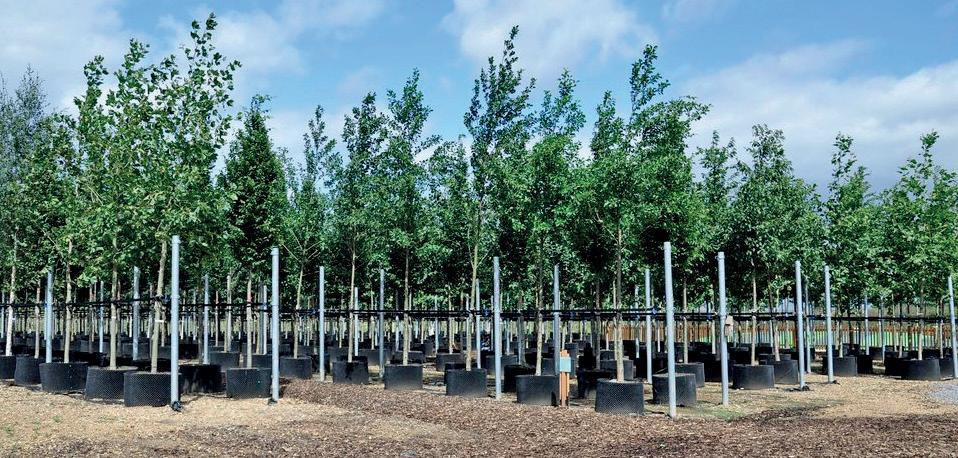
MAY 2013
Awarded largest roof garden project in London at the time, at Fulham Wharf for Barratt London, which won a BALI Principal Award in 2016.
OCTOBER 2014 MAY 2015
The company’s turnover hit £6.7m.
“I’d grown through TCL from when it was £9m to when it was sold at £75m, and then joined idverde which was a £250m business. I did various roles and had a P&L of a similar size to Elite. So, the size of the business I was running compared to Elite comparable, and the model was quite similar as well – remote teams, and a mix of subcontractors and different services.”
So, he met with Dave and Diana Twist for coffee, and visited a few sites before joining Elite in November that year.“We talked about growing pains as a business. TCL Group grew by around 8% a year organically and it was a great business, but we got to a size where those jumps were quite painful. You’re not in touch with everything on the ground the way
Completed the challenging scheme of forming the Goodman’s Fields Horses water feature, which is now a landmark in the City of London.
OCTOBER 2016
Turnover had trebled in two years to £19m, solely in landscape construction works.
you used to be, and you lose relationships the further up the tree you go and the bigger the business gets. It’s quite difficult to be in the detail. What’s nice about Elite is, if you look across our management team to our contract managers, the shortest time served in key delivery roles is 10 years. So, they know what the business is about, they know the fundamentals, and they know the clients. It’s rare that you get that across a tier.”
Sorabjee is being joined on the board by commercial director Mark Robinson, pre-construction director Scott Hawkes and marketing director Eliza, Twist’s daughter. A finance director already exists in the form of Whiting Landscapes’ Laurence Upcott.
And since Robinson has been “sat on the other side of the table”, Sorabjee says that he can bring a different outlook and understanding to the business, which is upskilling its contract managers.
The business has been built to where it is now by the reputation, and that comes down to delivering complex jobs at price
“Maurice Murphy (Whiting Landscapes’ managing director) and I are both Aston Villa fans, and when we were at Villa Park one day, I described my new role in Elite as being like the Villa manager,” says Twist. “You’ve picked your team, put them on the pitch and you’re watching them play rather than playing with them. I am genuinely excited about the future of Elite.”
Robinson joined five years ago from a commercial construction background, which he says is “quite different to anyone Elite had probably employed before”. He’s had a “lucky career”, working internationally in Australia and Abu Dhabi, for instance, and in various roles, from consultant to quantity surveyor. He joined Elite to work for a subcontractor. “I wanted to work for a landscaping contractor that did high-quality developments, and Elite came along. It was good timing and a good fit. I don’t have a landscaping background, but I’ve always been interested in it, and it’s the part that brings the project to life.”
MAY 2018
Awarded White City Phase 1 works by St James Group, with a contract value is in excess of £8m.
“It’s good for communication and empathy for what other people are trying to achieve,” explains Robinson.
“Sometimes when you have only come from one background, you don’t quite understand why things are difficult, and therefore you don’t quite have the foresight to try to deal with what might come your way. I think that’s something that I’ve brought to the business – a more rounded view.”


OCTOBER 2019
Company turnover surpasses £30m. Elite Landscapes wins a BALI Principal Award for a stunning project at One Blackfriars.
MARCH 2020
Completed works for Ballymore at Royal Wharf, a £9m contract, ahead of schedule and to budget.
OCTOBER 2020
60% of Elite Landscapes is sold to Whiting Landscape, a commercial landscaping company with a similar ethos and values, as part of the Twists’ succession plan for the business.
Hawkes, on the other hand, was most recently senior estimator at Elite – where he’s been for six years, achieving a record year for securing work with the estimating team last year –before stepping into his new role. “It’s been really nice to see how the company has grown since I joined to where it is now. Even in that time, there’s been a considerable increase in our turnover, our staff and the management setup.”
He fell straight into landscaping from Writtle College, starting at King’s Landscapes before wanting to work for a bigger operation. “It seemed the natural step at the time for me to work for a bigger hard and soft landscape contractor, and I saw Elite at the forefront in that space.”
We’ve got such good foundations for whatever we want to do, and we’ve got the right people

daughter, has been immersed in the company's journey, officially joining at age 15.
Additionally, since Elite's founding when she was just a year old, Eliza, Dave's
A Harvard Business School and Sheffield University alum, she brings her experience in property at Berkeley Group and investment banking, along with a unique female perspective to Elite’s board, further strengthened by her roles as
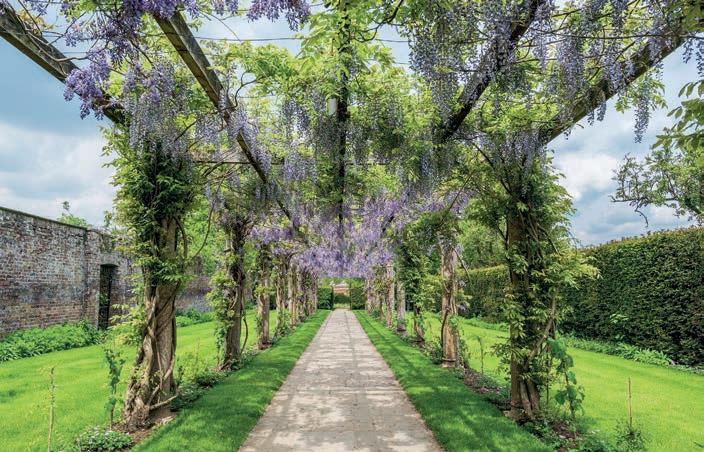
DECEMBER 2022
Oscar Sorabjee Joins Elite as operations director. Elite awarded BALI Principal Award for London Dock – C1-C3.
DECEMBER 2023
Elite awarded BALI Principal Award for One Thames City.
a member of Women on Boards and Google’s Female Advisory Council.
These directors are able to play a part in shaping the next chapter of Elite. It’s a team that’s looking to try different markets too, dipping Elite’s toe into street works such as the regeneration of Woolwich’s market square, as well as local authority tenders which are different to Elite’s usual method of winning work and have a “tough procurement process”, says Sorabjee.
“We’re still focusing on our core market but are growing into different parts of the sector...If we can grow steadily from a turnover perspective, great; but if that doesn’t work out and the bottom line grows, then we’re equally as happy. We’ve got such good foundations for whatever we want to do, and we’ve got the right people.”
As Elite enters its next chapter, Twist looks ahead with optimism. As CEO, he will focus on quality assurance and future growth while serving as a director of the British Association of Landscape Industries and a non-executive director. "I'm excited to be more hands-on with clients and site teams as we continue to drive Elite forward," he concludes.
NOVEMBER 2024
Oscar Sorabjee became managing director, with the support of fellow directors Mark Robinson, Scott Hawkes and Eliza Twist. Dave Twist steps into the role of CEO.



In an era marked by urgent climate challenges and biodiversity loss, the National Planning Policy Framework (NPPF) will continue to significantly impact both urban and rural landscapes in the coming decades.
The UK government’s ongoing review of the planning system, while necessary, is raising concerns about balancing ambitious development objectives with environmental sustainability. It is encouraging to see an ambition to invest in the housing and critical infrastructure we need, but these ambitions cannot come at a cost to the health of the environment, nor jeopardise the UK’s climate commitments and continue to perpetuate poor public health and inequality.
With a strategic, landscape-led approach to development, we have an opportunity to address interrelated crises in housing, climate, biodiversity, and public health. Any reforms to the planning system must take a holistic perspective on these challenges, and promote an integrated, joined-up approach to planning, design and delivery.
Following its recent consultation on the NPPF, the Landscape Institute has offered a set of recommendations to the government which would help to ensure that any reforms make the most of this vital opportunity.
Landscape is an integral part of the built environment, framing and enhancing the spaces around buildings as much as the structures themselves. A landscape-led approach is fundamental to creating cohesive, sustainable communities. By prioritising landscape, planners and developers can ensure that these spaces contribute to functionality, aesthetics, and overall quality of life, blending development seamlessly into both natural and urban settings.
Green infrastructure (GI) goes beyond simple green spaces; it represents a holistic, multi-functional approach to land use, enhancing public health, climate resilience, biodiversity, and social equity. The Landscape Institute recommends that every local authority should establish a clear GI strategy as part of its planning process. By incorporating GI, communities can benefit from services such as flood mitigation, cleaner air, and enhanced habitats for biodiversity. Development plans should prioritise GI contributions, fostering sustainable growth that supports natural systems.
For a planning system to be truly resilient, it must operate at a regional level, recognising natural rather than purely political boundaries. A system's approach would foster collaboration across boundaries to coordinate water management, nature recovery efforts, and green infrastructure networks. Such regional strategies can help create more cohesive landscapes that support biodiversity, reduce risks like flooding, and encourage sustainable land use. Collaboration among government departments and local policymakers is key to this approach.
The UK’s greenbelt has historically been designated to limit urban sprawl and protect rural areas. However, the Landscape Institute suggests that greenbelt land also offers significant opportunities to support ecosystem services. Through strategic planning, greenbelt areas could be restored and enhanced to increase biodiversity, manage water resources, and create spaces that support environmental resilience. It’s vital that these greenbelt lands are not neglected but instead seen as valuable assets that can bolster local ecosystems.
Ian
Phillips CMLI , the Landscape Institute ’s policy & communications committee chair, sets out a series of suggestions for government
Strategic Environmental Assessments (SEAs) and Environmental Impact Assessments (EIAs) help inform planning policy and decisions by assessing potential environmental impacts at an early stage. These assessments are critical in avoiding unforeseen adverse effects that could undermine sustainability goals. The Institute stresses that EIAs and SEAs should continue to be a key requirement in the planning system, ensuring that all projects are evaluated for their environmental impact from the outset.
The need for affordable housing is pressing, but so is the need to build sustainably. Local authorities should adopt local design guides that emphasise quality, climate resilience, and affordability. By promoting housing that is built to last, uses sustainable materials, and provides transparency on lifecycle costs, planners can improve end-user experiences and reduce environmental impacts. Housing developments should not only meet current needs but also anticipate and withstand future challenges related to climate and resource constraints.
LEVERAGING LANDSCAPE DESIGN TO COMBAT CLIMATE CHANGE
Climate resilience can be enhanced through careful landscape planning. By considering siting, layout, topography, orientation, and micro-climate, developers can create spaces that naturally support energy efficiency and reduce environmental impacts. Thoughtful landscape design can transform urban spaces, making them more adaptive to climate extremes while providing comfort and aesthetic value for residents.
To counter biodiversity loss, the planning framework should require local authorities to allocate dedicated areas for nature conservation and recovery. Development projects present opportunities to build out Nature Recovery Networks and connect green infrastructure across landscapes, creating corridors that support diverse species and enrich ecosystems. Integrating natural spaces into urban planning contributes to biodiversity while offering residents access to nature, which has proven benefits for physical and mental health.
The UK’s evolving planning system holds great potential to lead the way in sustainable development. However, ensuring that growth aligns with environmental priorities will require careful consideration of landscape, green infrastructure, and regional coordination. The Landscape Institute’s recommendations offer a path toward resilient and thoughtful planning that respects the natural environment while addressing housing and development needs. Landscape professionals can spearhead this vision by promoting sustainable, effective, and aesthetically pleasing outcomes in both urban and rural development, shaping communities that are ready for the challenges we face. We urge the government to take on board our recommendations, and look forward to working with ministers, civil servants, local authorities and other decision makers across all UK nations in the years ahead.
See the Landscape Institute’s website (landscapeinstitute.org) for its response to the proposed reforms to the NPPF or get in touch at policy@landscapeinstitute.org to learn more.
Holly Youde advises how to approach partnerships wisely and ethically to make the most of the opportunity
As demand for outdoor living spaces grows, designers and landscapers are partnering with brands or suppliers of outdoor furniture, kitchens, and covered areas. However, it’s important to carefully consider which option is the best fit before jumping on the bandwagon.
When choosing brands or partners to collaborate with, you should consider quality, alignment with your own values, and reputation. Eco-consciousness is also becoming increasingly important to clients, so aligning with brands that prioritise sustainability can set you apart.
Despite the advantages, there are potential downsides. One of the main risks is the loss of perceived impartiality. If clients sense that a designer or landscaper is pushing products for personal gain rather than choosing the best options for the project, it can affect trust. Client needs should be prioritised over partnership benefits. Another consideration is limitation of choice – by exclusively working with specific brands, you may reduce the range of options you can offer clients.
reinvestment. In many ways, approaching such a partnership is like starting a new business from scratch, and it may even be more effective to treat it as a separate entity.
Financially, these opportunities operate differently. Additionally, working with other brands means having no control over their future decisions. Key considerations are: What will the partner contribute to your business? What are they planning to create and launch? Will you need to invest in display models, showroom space, marketing and staffing? How long will it take to see a return on investment? And will reinvestment be required down the line?
Approaching such a partnership is like starting a new business from scratch, and it may even be more effective to treat it as a separate entity
For those looking to streamline the process, there are companies that specialise in partnering with designers and landscapers for exactly this purpose. Collaboration often trumps competition, particularly in today’s economic climate. Whilst the margins may initially seem lower, when you factor in the cost and required investment of going direct, the difference may not be as significant as you think.

HOLLY YOUDE
Former chair of the APL, Holly Youde, is a director at Urban Landscape Design in the North West and The Landscape Academy, a purpose built training centre dedicated to landscaping in the UK.

JAKE CATLING
Jake founded his domestic landscaping company, The Landscaping Consultants, aged just 24. He is now a BALI board director, host of the Landscape Performance Podcast, and has delivered various award-winning gardens and outdoor spaces.

Ken White, former chairman of the APL, leads the multi-award-winning Frosts Landscape Construction, which carries out large commercial and private estate projects across the UK.

Strategic partnerships offer opportunity for you to capitalise on the outdoor living trend, provided the relationship is mutually beneficial. However, it’s important to recognise the time, infrastructure, marketing, and showroom investment these partnerships require, along with the need for ongoing
Whilst a strategic partnership can be a valuable boost to your business, it’s no quick fix. If you’re considering expanding your offerings, take the time to approach it thoughtfully, backed by thorough research and a clear strategy. Whatever route you choose to take, one, none or all my advice would be to work with people you like. It helps with the whole process – and why not make it an enjoyable one!
Rosemary has won numerous awards for her work, creating high quality gardens for both domestic and commercial clients. She is a fully registered member of the SGD and sits on the board of directors at BALI.

JILAYNE RICKARDS
Based in Cornwall, Jilayne Rickards is a multi-award-winning garden designer who puts sustainability and biodiversity at the heart of her designs, including her show gardens at Chelsea, both of which have been relocated to the Eden Project.

All
2025
Discover






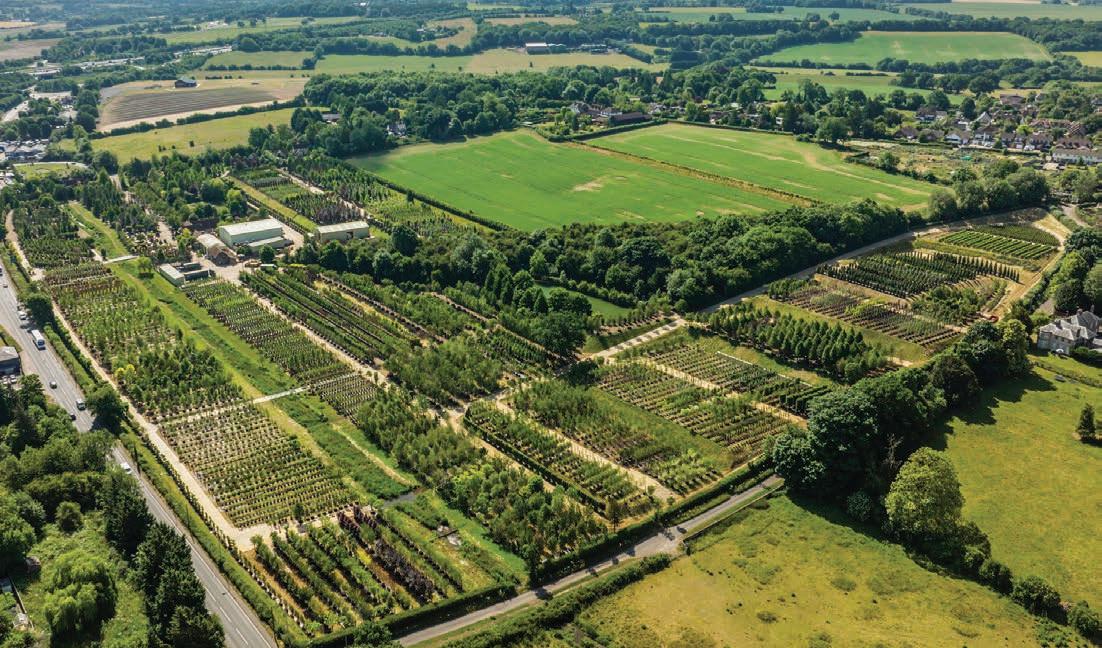




Please



Lucy Lovelock and Kai Sammer of Oracle Solicitors provide an update on employers' responsibilities regarding workplace sexual harassment
On 26 October, the new Worker Protection (Amendment of Equality Act 2010) Act 2023 came into force, introducing key changes to employer’s responsibilities. This new law emphasises the need for employers to actively prevent sexual harassment in the workplace. Any businesses, whether managing a small crew or a larger firm, need to be aware of these changes to stay compliant and protect both staff and the business.
One of the most important aspects of the new law is that employers are now required to take “reasonable steps” to prevent any form of harassment, including sexual harassment, from occurring in the workplace. Additionally, the law extends employer responsibility to incidents of harassment caused by third parties – this could include clients, suppliers, or even members of the public who interact with the company’s team. The new legislation follows guidance from the Equality and Human Rights Commission (EHRC) titled Sexual harassment and harassment at work: technical guidance, which provides definitions and recommendations on preventing harassment.
According to the EHRC:
• Harassment involves any unwelcome behaviour connected to a protected characteristic (such as gender, race, or age) that makes an employee feel intimidated, humiliated, or degraded.
Compliance with the new laws is not just about avoiding legal trouble; it will ensure that employees feel safe, respected, and valued whilst
at work
• Sexual harassment includes any unwanted behaviour of a sexual nature, such as inappropriate comments, gestures, or physical advances. Even seemingly minor incidents can be legally actionable if they negatively affect an employee’s work environment.
Key changes under the new Act:
• Duty to prevent sexual harassment: Employers are now required to prevent harassment, rather than just reacting when incidents occur. This means putting measures in place to prevent problems before they start.
• Third-party harassment: If harassment comes from outside the company – like suppliers or clients – the employer can still be held responsible. This is especially relevant for those businesses that operate predominately outside and on job sites.
• Increased penalties: Employers found to be non-compliant with the new rules could face a 25% uplift in damages awarded to victims of harassment.
To avoid liability and create a safe, respectful workplace, companies should consider the following:
• Up dating company policies: Review and update your anti-harassment policies to reflect the new law and communicate these to all staff. You may also need to revise external policies or contracts with clients to address third-party liability.
• Provide training: Regular training is key to ensuring your staff understand what constitutes harassment and how to report it. Make sure training materials are up to date with the latest legislation.
• Implement a complaints procedure: Have a clear, confidential process in place that allows employees to report harassment, without fear of retaliation. Complaints should be handled promptly, with thorough investigations and appropriate actions when misconduct is found.
Compliance with the new laws is not just about avoiding legal trouble; it will ensure that employees feel safe, respected, and valued whilst at work. A proactive approach to preventing harassment can also help build a positive workplace culture, improve staff morale, and ultimately lead to better business performance.


Oracle Solicitors is an award-winning law firm with a deep understanding of the landscape industry and expertise in employment, commercial, litigation, property and contract law. Oracle Solicitors, founded in 2002 has since grown to include offices in London, Belfast, Naples, Frankfurt, and Tirana, please visit: oraclesolicitors.co.uk
Stand out from the cowboys by showcasing your company’s standard of work, says Gareth Wilson
As a contractor, I feel the need to take positive action to combat the cowboys, and I see this happening by educating clients
The current state of my expert witness work is overwhelming. The increasing number of poor quality projects I come across is alarming, to say the least. It's been a while since I've encountered a project with only minor snags; most require complete re-installation, and Mr. Alan Sargent shares my concerns.
This may be controversial, but cowboys are running rampant, making finding work challenging for reputable contractors, especially when work is thin on the ground at the moment. Many of these cowboys have a smooth sales pitch and offer low prices; but to be honest and fair, clients are starting to realise the risks of going for the "lowest price”.
As a contractor, I feel the need to take positive action to combat the cowboys, and I see this happening by educating clients, giving them confidence in your abilities and building relationships.
Confidence can come from membership in governing bodies such as the British Association of Landscaping Industries (BALI), the Association of Professional Landscapers (APL), and Bradstone, which guarantees its work through its approved installers scheme. As I've mentioned previously using reputable suppliers is also very important, not to mention tried and trusted products.
From a paving point of view, the highly anticipated BS7533:102 installation document will be available when this article is printed. I highly recommend that you become familiar with it, especially Clause 4, which covers domestic installations where no design has been provided. As a member of the B/507 committee and the 102 panel, I can assure you there's a lot of good information to absorb. Being able to show clients relevant parts of the document to show
you as company work to best practices, I feel, is a good angle to work to.
Relay information to clients regarding their obligations, such as conforming to SuDS in the case of driveways and hiring a company that also works safely and has relevant documentation in place, such as Construction Design Management 2015 files (CDM), which is required by law. If unsure about CDM, there are courses up and down the country and convenient phone apps to use too.
Finally, a good website and regularly updated social media platforms, such as Instagram and Facebook, allow clients to see your previous and ongoing work. Offer to take clients to view your completed projects and speak to them. I would advise not just taking potential clients to recent projects, but projects completed two to three years ago, which show the all-important longevity of your work.
The takeaway here is to stick to your standards and price, educate clients, and constantly look to better yourself and your company. Remember, the cream always floats to the top.

GARETH WILSON
Leaving college at 17, Gareth has worked in the landscape industry since 1989. Progressing onto high-end projects, he has picked up seven RHS gold medals. He is a member of multiple professional bodies. He provides technical and product advice to large companies, mentors and trains contractors and garden designers in landscape construction and on show gardens logistics across the UK. Gareth also provides mediation services, he is a member of the BS7533:102 committee and is an industry awards judge.
gkwilsonlandscaping.co.uk

Manufactured from durable aluminium grade 6005A, AluExcel is recognised as the highest quality and strongest proven aluminium edge in the market.
AluExcel won’t rust, is lightweight and built to last. It is fast to install and perfect for creating a sleek, defined look to your landscape.
10 different heights


Drawing from a year of deep learning and practical insights, Jake Catling and Sam Grayson of Hyphae Learning share core learnings to help drive the landscape performance in 2025
Through rich discussions and hands-on experiences with professionals throughout 2024, we’ve pinpointed practical approaches for those aiming to innovate, build resilient teams, and work in harmony with the environment. Here are some of our top takeaways from 2024, highlighting a roadmap for growth and sustainability.
Embracing innovation with curiosity
One powerful insight from 2024 was how curiosity leads to real, sustainable change. Simple questions like,“How can we work with nature?” spurred creative solutions, from rain gardens to green roofs. By staying open to new ideas, we can respond to environmental challenges with practical, forward-looking practices that build resilience for the future.
Adaptability and passion as foundations of career fulfilment
A recurring theme in 2024 was the importance of adaptability and ongoing passion. As the industry shifts, professionals who embrace new trends and technologies thrive. Whether just starting out or decades in, flexibility and a commitment to continuous learning keep careers fulfilling and relevant.
Building a team culture rooted in empathy
Whether just starting out or decades in, flexibility and a commitment to continuous learning keep careers fulfilling and relevant
Leading through simplicity and clarity
Conversations with leading designers and project managers reinforced that simplicity is key to effective leadership. By cutting through jargon and focusing on clear, direct communication, leaders create an environment where everyone feels confident in their role. This no-nonsense approach improves alignment and empowers teams to focus on impactful work.
A positive team culture doesn’t just happen; it’s cultivated. Leaders prioritising empathy and kindness build environments where team members feel valued and engaged.
Asking hiring questions like, “What do you do for others?” helps ensure team members bring a spirit of respect and collaboration, driving both individual and collective success.
Encouraging accountability and growth
Structured coaching and clear role definitions emerged as critical factors in team success. By clarifying responsibilities and focusing on individual strengths, leaders create an environment of accountability. This approach builds productivity and reinforces a strong sense of purpose within teams.
Balancing efficiency and environmental responsibility In 2024, it became clear that balancing efficiency with
environmental responsibility is essential. From resource-efficient processes to eco-friendly materials, embracing this balance allows us to protect the planet while remaining profitable.
Focusing on holistic wellbeing
Landscaping is physically demanding, but mental and emotional resilience are equally vital. An “energy buckets” approach emphasises the importance of holistic health— physical, emotional, mental, and spiritual. A balanced approach enhances creativity and endurance, making a sustainable career possible.
These highlights from 2024 help to lay a foundation for a future where the landscape industry is resilient, innovative, and closely aligned with nature and the environment. By integrating some of these insights, we can approach 2025 with renewed purpose and confidence.


knowledge from the industry to give business owners the place to go to upskill and empower their teams.



Season long residual weed
Season long residual weed control for annual & perennial control for annual & perennial weeds and grasses weeds and grasses up to 5 months up to 5 months


Fast acting contact herbicide
Fast acting contact herbicide with control of small weeds on with control of small weeds on bare soil around trees and bare soil around trees and other permeable surfaces other permeable surfaces


plant
and green control
surfaces





“FOR THOSE OF US WHO BUILD THE GARDENS, AND FOR THOSE WHO ARE DESIGNING THEM, CHELSEA IS THE ONE PART OF THE YEAR WHEN YOU’RE ALMOST CUT LOOSE, AND YOU CAN BE SUPER CREATIVE”
As The Outdoor Room goes into its 30th year, it’s marking the occasion with a rebrand and a new managing director at the helm – Mark Britton


Mark Britton is not a huge fan of change. He prefers a “steady ship” rather than switching company year on year. And his loyalty has paid off. After 10 years at The Outdoor Room, Britton has been announced as its new managing director.
The Sussex-based company was founded by the charismatic David Dodd back in 1995 and, as it goes into its 30th year, it’s also undergoing a rebranding. The Outdoor Room has become one of the most reputable in its field, picking up a long list of RHS medals and BALI National Landscape Awards. But a slightly slower season sparked a chance to consider a refresh.
“It’s been an interesting year,” says Britton. “We’ve had some very quiet periods of work throughout the summer. We could see that the rest of the year was looking really buoyant, so it was short term, but it gave us a chance to discuss rebranding and redoing the website.
“Genuine blood, sweat and tears have gone into getting the company to where it is now, and that’s a huge credit to David and his dedication and passion. He really loves the company and the people. But we thought maybe the time is the right, with the anniversary next year, to take a look at the branding.”
The Outdoor Room is not reinventing itself though, says Britton. “It’s putting a new spin on what is already a good brand to generate interest and avoid complacency. We’re not looking to take over the world and be a massive conglomerate, but we want to make sure people understand who we are as a company, that we’re passionate about what we do, and that we’re taking that forward. We’ve got some great people in the company, some really passionate young team members, and we feel we owe it to them to give them that future as well.”
Britton first joined as a foreman before stepping into the management team two


years later and somewhat “overnight” became the sites and shows manager.
Whilst The Outdoor Room took a break from this year’s event, the RHS Chelsea Flower Show continues to be key for the company going forward.
This year, it’s building two gardens, one of which is The Avanade ‘Intelligent’ Garden for multi-medal winning designer Tom Massey and architect Je Ahn, the duo who created the jawdropping WaterAid Garden in 2024.
AI is being embedded to show how it can be used for its management and aftercare, with sensors providing data such as soil moisture and air quality. This will help to create a digital twin of the garden through which trends will be tracked to show how it might perform in a changing climate.
We want to make sure people understand who we are as a company, that we’re passionate about what we do, and that we’re taking that forward
“People’s perceptions of AI can be quite negative – that it’s putting humans out of jobs, and it’s maybe not as human as we’re used to from the point of view of decisions or situations. But the idea behind AI being used in the garden is to assist humans in caring for and nurturing their garden. So, it certainly isn’t to replace humans or get rid of that human interaction; it will benefit them with their horticultural surroundings.”
He admits it will be a “steep learning curve” but he is interested to “scratch the surface” of AI and to see it in reality.
“It’s going to be a fascinating journey. AI is going to be part of everyone’s life in some form or another, so it will be interesting to see how it benefits normal people in the real world, rather than the negatives you hear about.”

Chelsea is arguably the perfect test bed for these emerging technologies. “For those of us who build the gardens, and for those who are designing them, Chelsea is the one part of the year when you’re almost cut loose, and you can be super creative. We’re dealing with people, products and technologies that we wouldn’t necessarily come into contact with on a day-to-day basis, which might give us inspiration or techniques or ideas for how to do things in the real world.”
The Outdoor Room will also be building The Addleshaw Goddard: Freedom to
Flourish Garden, designed by Carey Garden Design Studio – a space that will highlight the benefits of a slower pace of life with a landscape inspired by North Norfolk.
“It’s a very different garden, and smaller, but actually with a lot of detail in it, so it will be no less challenging than one of the large show gardens. Sometimes being smaller makes them trickier to do because everything is so visible from every angle –it keeps you on your toes. So, it’s going to keep us busy between now and the end of May.”
Fortunately, Britton has plenty of show garden experience, even before The Outdoor Room. Having left school at 16, he ended up taking a job with a friend of his parents who had their own small local landscaping company near Epsom, with every intention of going back to do his A Levels. But a passion for landscaping took him by surprise.
college to learn the book version of landscaping whilst you're putting it into practice for those other three weeks with somebody that's very much hands on.”
The idea behind AI being used in the garden is to assist humans in caring for and nurturing their garden. So, it certainly isn’t to replace humans
He’d do more than work on the mixer too, going to client meetings and learning how to run the business. After a couple of years, though, he was asked to go selfemployed – which at just 18 years old wasn’t an appealing prospect. So, he left to work for Acorn Landscapes where he spent six or so years working for a “really amazing” foreman who grew his skillset to work for a larger company with bigger projects. Again, though, he was asked to go self-employed and work for Acorn – and this time, he tried it but was “quite often left out of pocket”. That’s when he went on the hunt for a new role and approached what was then called Landmark.
“It happened to be a particularly nice summer, which probably helped. I just bizarrely fell in love with it out of the blue. My parents would say that when I was younger, I hated getting dirty in the garden. So, it was a bit of a shock to them when I told them I was sticking with it.”
Britton says he was fortunate, in that his boss at the time – and everyone he has worked for and with since – was “incredibly supportive and helpful”. “He insisted that I go to college and learn about landscaping, so I went to Merrist Wood for two years whilst working for him. I’d do one week a month at college and then three weeks at work, which worked really well. You had long enough at

1 2010 Chelsea Gold Medal garden for James Wong
2 2011 Gold Medal show garden for Jim Fogarty
3 Mark Britton & David Dodd in 2021 garden
4 Detailing the water feature, Chelsea 2023
5 Mark Britton & David Dodd in 2023 garden
6 Outdoor Room build team and Gavin McWilliam

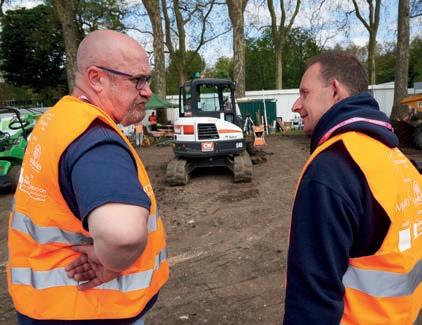
“I went for an interview with Mark Gregory when the company was based in Chertsey, and it was such a massive step up in terms of scale and quality and people. There were so many different departments. He asked me to take him to three jobs that I’d physically worked on, so I remember taking him on a tour which felt like a lot of pressure, but I was lucky enough to get the job.”
It’s at Landmark – now Landform Consultants – that Britton experienced his Chelsea debut. He spent an “amazing” 17 years at the company and remains friends with Gregory, still seeing him often – which is unsurprising, considering Britton’s wife Catherine MacDonald is Landform’s principal landscape designer.
it’s about that gut feeling when you interview them. Are they going to fit in with The Outdoor Room team?”
Britton fit in straight away and quickly worked his way up to management. “I think David was perhaps looking for somebody with some wider experience to come in and work with the core team to be that bridge between office and site. So, he called me when I was working on a job in Kingston and said that I should start in the office the next day.”
Whoever we employ, they have to fit in first and foremost. It’s not just about their skillset and potential; it’s about that gut feeling when you interview them
He met Dodd through the show garden circuit and, in 2014, decided to take the next step in his career and take a job at The Outdoor Room. “It’s much smaller in scale, in terms of the number of people, which I enjoy. Everybody is very connected, and it feels more personal. Up until recently, everybody has been very local, though we’ve started to spread out more. But generally speaking, it’s been Horsham-based staff which has meant that people often socialise on the weekends and get together – it’s bred a really tight-knit team.”
Britton is hoping to continue this culture and ethos that Dodd has created. “Whoever we employ, they have to fit in first and foremost. It’s not just about their skillset and potential;
His desk was next to garden designer Joe Perkins, who has since left to set up his own practice. Both Perkins and Dodd made the change in role “as stress free and as seamless as you could hope”, supporting Britton with the transition. “It was a massive change for me; I’d never worked in an office before, and my computer skills were minimal. So, learning those was quite a big hurdle in itself.”
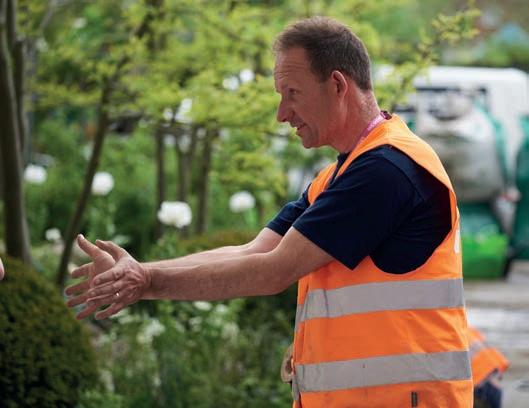


The role evolved into taking on responsibility for managing the show gardens that The Outdoor Room took on. “By the time I left Landform, I’d been overseeing two or three of the Chelsea builds each year. So, that gave me a good grounding to help Dave. His team was already experienced at Chelsea, but he wanted someone who could take it further and help
out with the behind-thescenes management –which is really a sixto eight-month process. And I really enjoyed that, becoming more involved and going to meetings with the designers and sponsors and helping plan and build the garden in the months leading up to the show. It’s more stressful, because it’s your problem if something goes wrong; but Chelsea is amazing, and it becomes such a big part of your life without you even realising it.”
He has an understanding wife, though, who is well aware of the time and pressure that goes into creating a show garden, being a multi-RHSmedal-winning designer herself. Britton accepts that not everyone is in the same position. “When we ask our guys to build a garden or two gardens at Chelsea, it has a massive impact on a personal level. It’s great fun, and there are some financial rewards with overtime, but it’s hard work. We

stay away for the duration of Chelsea, which can be around three weeks away from home, and some have young families. So, I’m really empathetic to them.”
Britton says that he takes “great pride” from his involvement in Chelsea over the years and taking home various Gold medals. “It’s a special place to go back to every year. It gets slightly more difficult each time, but it still draws you back in because of the people element; it’s very close to my heart, and I know for David it’s the same.”
A show garden is there for a week, for the public and for exposure. It's what we do for the other 11 months of the year that is the most important thing that we do as a company
But he’s aware that there’s an “element of show business” to it. “A show garden is there for a week, for the public and for exposure. It's what we do for the other 11 months of the year that is the most important thing that we do as
a company, because that’s forever, for clients and families.” Understanding this, and his eagerness to continue the family feel of the business, is likely one of the reasons Britton was the ideal person to take over the reins of the company as managing director.“David needed to reevaluate the balance of what he was doing himself, from a management point of view and his involvement in The Outdoor Room and Pots & Pithoi” – a local Cretan terracotta pot supplier that Dodd acquired in 2017.
“He was incredibly busy. It’s very stressful and leaves you virtually no time when you’ve got two businesses. So, there was a discussion about how he might step back slightly from The Outdoor Room, and it’s been a slow transition. It had to work
for David as the company owner and it had to work for the company, in making sure I knew what I was doing. It’s a big responsibility.
“Every time there’s an evolution in my role at a company, there’s a gradual process for me of fully appreciating what’s involved and the responsibility that comes with it, the increase in pressure or time, and a much greater understanding of people like David and Mark Gregory who have run businesses for 30 years or more. So, it’s been around 18 months or so of discussions and, in true Dave style, it happened overnight.”
It’s arguably the pinnacle of what has been an impressive career for Britton so far.
“I’ve been really lucky and done some really amazing things. And fingers crossed there will be more amazing things in the future. This is what you hope you can pass onto anybody that is interested in landscaping or another industry; if you show commitment and motivation and have that little bit of luck, when you come across a company or an employer or a boss who is willing to invest in you as a person, then you can get out of it what you put in. That’s the bottom line. It shouldn’t be as easy as being given.”
It can be a difficult career path though, admits Britton.“Certainly within a smaller company like ours, being able to promote people through the ranks is really tricky. If you’ve got a team of settled team leaders, how do the younger team members go from learning the skills every day to becoming foreman without us as the management team setting up new teams for them to do so? Naturally, you might lose people who are really keen and motivated who want to move up, and that’s understandable. Helping those people find a place is the hardest but also the most rewarding bit.”
Britton is not opposed to growth, but not if it risks the existing culture. “If it’s something we’re able to do in the way that we want it to be done, then it’s something we’ll happily do; but not to the point of it compromising how we like to run the company currently.”
And after a decade with The Outdoor Room, how the company is run is now in his hands. The rebranding is arguably a way for Britton to mark this change and an exciting new era for the business but make no mistake; The Outdoor Room remains a steady ship, just the way Britton likes it.
7 The Outdoor Room build 2023 show garden
8 Mark Britton in 2023 Silver Gilt Medal garden
9 Homebase Garden by Adam Frost & Landform Photographs ©Steve Wooster and Jay Watson

Schellevis® produces concrete paving and elements to connect architecture with nature. Always supporting and respecting the outdoor space they are placed in.
The entire range has the same Schellevis® appearance. Used in combinations, the products help transform every outdoor space into a harmonious, timeless living environment.
Visit our website to see our products in a variety of outdoor spaces, in different ways and often combined. GUIDED

Project budget
£150k
Build time 5 months
Size of project 400m2 Awards
Shortlisted for the Pro Landscaper
Project Awards 2024
The brief, to create a striking contemporary garden to relax and enjoy with friends and family in all seasons. The client wanted the garden to feel modern whilst remaining sympathetic to the period and agricultural architecture. It should also not detract from the surrounding landscape but instead attempt to lead the gaze out to capture the borrowed views.
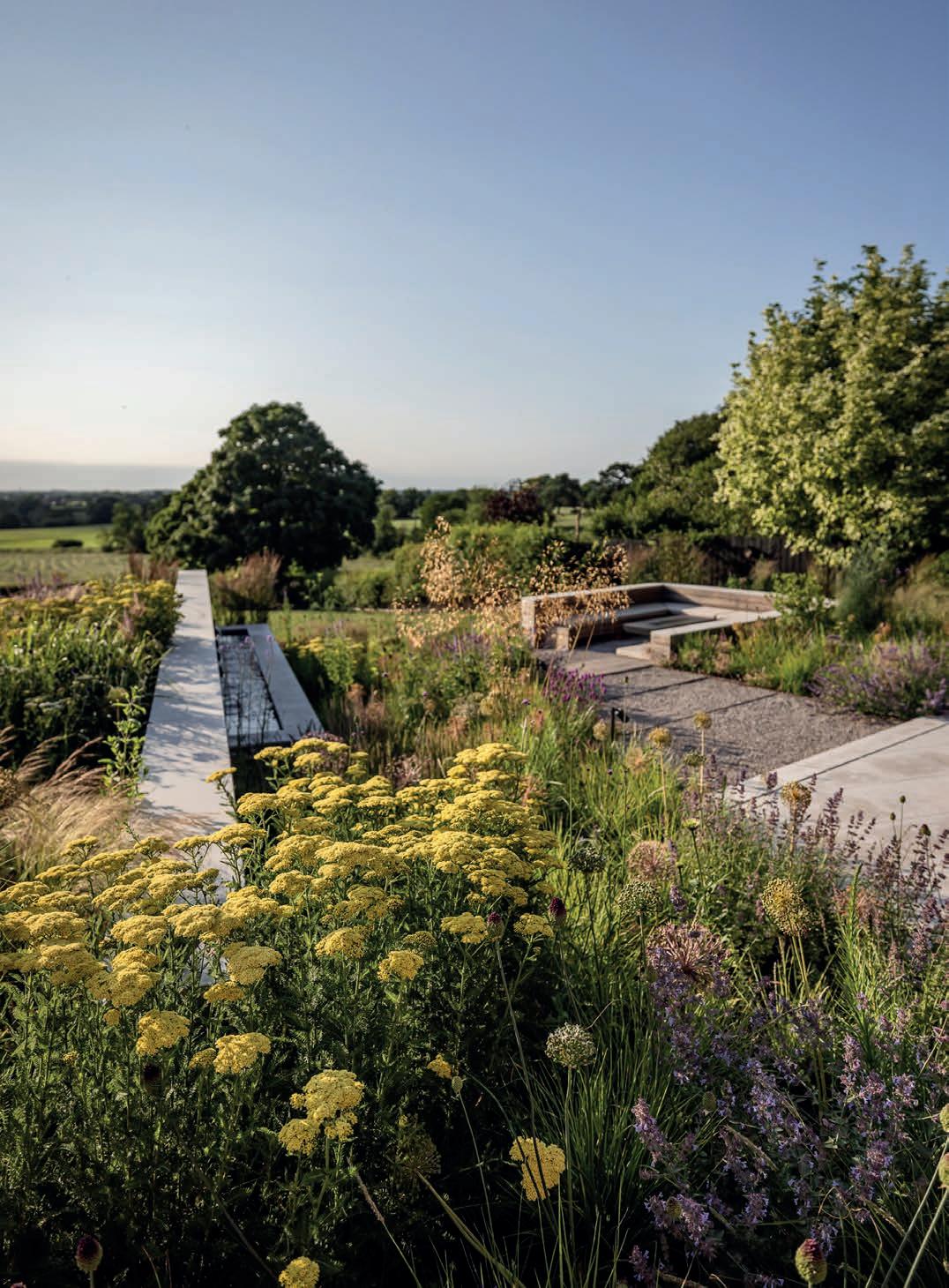


To create a welcoming approach to the front door and a sense of arrival, they clearly defined the boundary between the ‘front’ and ‘back’ gardens, drawing attention away from the adjacent driveway and parked cars visible from the terraces. The scheme included a pavilion to provide a sheltered entertainment area with an outdoor kitchen and living room, as well as a fire to enjoy being outdoors in all weathers.
It should provide a practical transition to the lawn with steps and terraces and a large
extended patio with focal points in the foreground in the form of a water feature and ornamental trees. Naturalistic style planting with lots of grasses and colourful perennials would then seek to blur the boundary between garden and surrounding landscape. Upon first arrival at the project, Robert Hughes Studio immediately recognised that the garden felt inadequate and confused, with cars dominating the view from the dated terrace. Previously, opening the front door revealed a line of parked cars and sparse, unremarkable shrubs scattered around an uninspiring terrace. Now, this scene has been transformed into a welcoming view of a stone wall framed by lush, beautiful planting.

As it quite boldly juts out into the distance along with the vision and sound of water, it draws the gaze straight out to the surrounding views. The impact of the wall is
felt all around the garden and it creates a designated parking space, but also divides the garden and covers the cars whilst on the terrace –something the clients had thought was impossible. Juxtaposing with the dry-stone walling, the perennial meadow also connects the garden to the surrounding landscape, blurring the boundary between garden and countryside. The trees mirror those dotted in the hedgerows which pulls the countryside closer. But despite the mass of hard landscaping, the garden feels comfortable in its environment thanks to the planting.
The exposed position meant that shelter was key, however Hughes was keen not to let the inclusion of a building negatively impact the site and block or detract from the views. The use of louvered slats on the
pavilion allows the user to experience the views or shelter from the elements. The oak frame structure echoes the agricultural history of the site, and the contemporary styling provides a focal point. As an outdoor living space, it enables the clients' enjoyment of their garden in all weathers whilst its positioning helps to draw the eye to the natural backdrop.
Robert Hughes Studio added an abundance of planting and adjacent wildflower meadow designed to encourage wildlife and help to support local biodiversity. Quality materials were also selected as they will weather well and last the test of time; hopefully creating a landscape that will look as good in the distant future as it does today and avoid the need for continuous regeneration.
The main challenges faced by Robert Hughes Studio was the creation of a Garden Pavilion structure that let in plenty of light whilst preventing rain and wind from making it unusable in such an exposed site. Making sure that it didn’t block the view but instead enhanced it only added to the challenges faced. The position to the right side of the garden and the landscape aspect

of the building means that it doesn’t block the view; instead, it uses perspective to draw the eye toward the distant scenery beyond.
The pavilion includes a bespoke modular concrete kitchen, designed and developed with Davinci Designer Concrete, who also installed the luxurious micro-cement render
on the chimney and created the bespoke concrete dining table, benches, cantilevered fire table and concrete pots.
The building is wired to the clients' smart home and includes speakers, security cameras, lighting, and an outdoor TV, all controllable from a mobile phone.
1 Feature wall leads the eye to borrowed views
2 Views are framed by Amelanchier lamarkii
3 Reflections in a Corten water bowl
4 Corten plate, water chutes & stone clad trough
5 Pavilion with louvres for climate control
6 Juxtaposition of hardscape & naturalistic planting
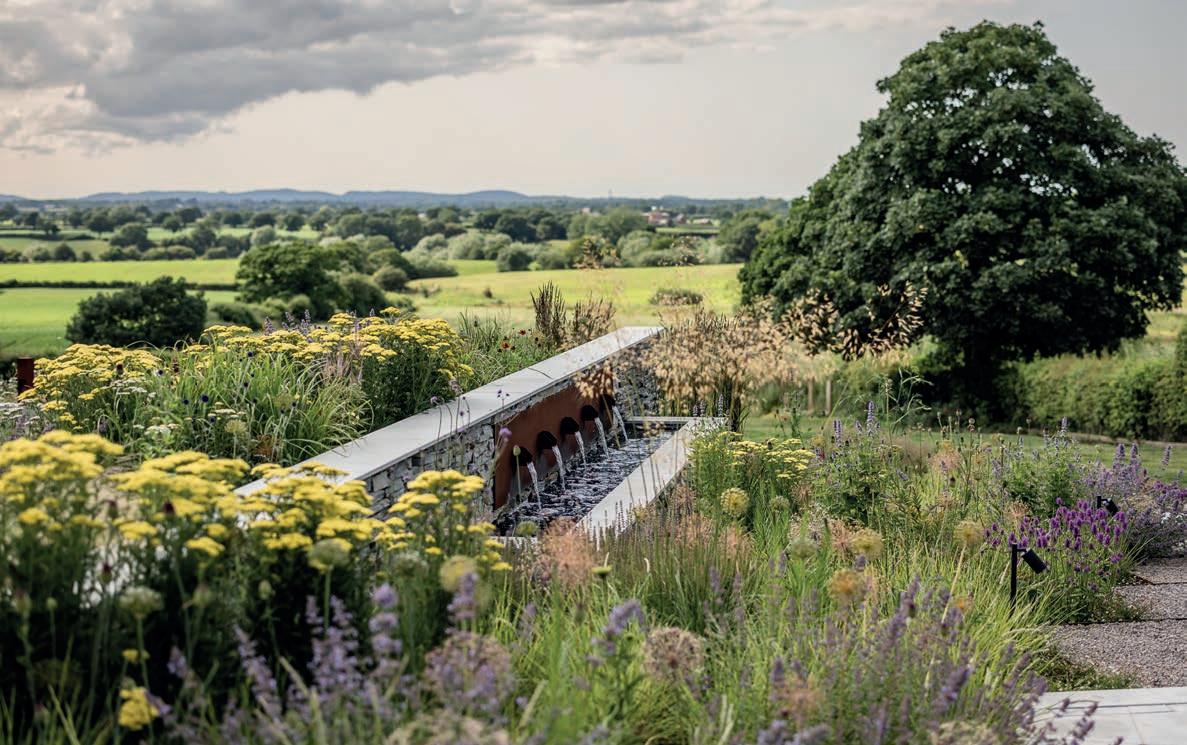

A technical challenge came in the construction of the chimney and the heat from the inset stove and position of the outdoor TV. Originally, the TV was going to be recessed into the wall but during construction the fire was tested and it determined that the heat in the recess could pose a problem. It was decided that the best course of action would be to mount the TV on the face of the chimney to allow for better ventilation.
As for the site gradient, the three terraces provide a practical solution to this and perform functions for different moods or times of the day – from relaxed lounging to formal dining and evening entertaining around the fire. The connecting steel and gravel steps, with one intersected by decking that extends from the bench, add a touch of playfulness and movement.


The dry stone wall then defines the front and back garden and conceals the parked cars. Whereas the client once opened the front door to a row of parked cars and sparse, unremarkable shrubs scattered around an uninspiring terrace, they are now met with a stone wall directly ahead, nestled among beautiful, vibrant planting.
As it also boldly juts out into the distance along with the vision and sound of water, it draws the gaze straight out to the borrowed views and the impact of the wall is felt all around the garden. It not only establishes a designated parking space but also divides the garden and conceals the cars from view when seated on the terrace.
Robert Hughes is an award-winning garden designer at Robert Hughes Studio Ltd in Knutsford, Cheshire. It is a small studio specialising in intricate and immersive landscapes for the high-end domestic and commercial clients in the property development market. Its highly detailed and considered approach is similar to that of an architect. Robert Hughes Studio provides innovative ideas and bold composition. roberthughesgarden design.co.uk ABOUT
Contractors Base Squared basesquared.co.uk
Plants and trees
Viridis Plants viridisplants.co.uk
Plants and trees
Ladybrook Nursery ladybrooknursery.com
Concrete furniture Da Vinci
Designer Concrete concretecooperation.com
Electrical system Sonar Electronics sonarelec.com
Paving London Stone londonstone.co.uk
7 View of the terraces
8 Microcement rendered chimney and inset stove
9 Luxurious limestone terrace Photographs ©Mark Spencer (mark-spencer.com)
Pavilion frame Hardwoods Group hardwoodsgroup.com

































































PART OF EGO’S NEXT GENERATION OF PRO X TOOLS, THE PGX POWER BANK IS A BREAKTHROUGH CHARGING SYSTEM FOR ALL DAY BATTERY POWER IN SUPERFAST TIME.
Wherever work takes you, the portable PGX Power Bank has two charging ports to keep your EGO ARC Lithium™ batteries fully charged. Empowering all petrol-beating Pro X tools to tackle the toughest jobs in the toughest conditions. Take all-day professional working to the next level.
SCAN THE QR CODE TO FIND OUT MORE OR VISIT YOUR NEAREST DEALER.

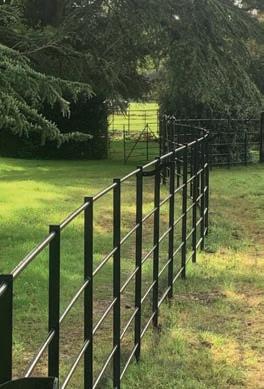




What started as a simple decking project at a family home in Chorleywood quickly developed into a full garden redesign. Karl Harrison Landscapes was tasked with creating a raised decking terrace with minimal balustrade, allowing for an easy transition from usable space to enjoy with the children and compete in Swing Ball tournaments, to a relaxing place of serenity with white flowers taking a lead in the planting scheme to set the tranquil atmosphere.

The decking has been designed to guide the client down from their property then welcoming them into a calming, natural garden with an abundance of insect and pollinator plants, winding paths, and a circular lawn. An exciting new landscape came to life within the traditional outdoor space.
For this project, the deck was the structural aspect of the garden, so it had to be something special. Fortunately, the natural slope of the garden gave Harrison the opportunity to design a cantilevered deck. This design makes the leading edge appear to float – something Harrison emphasised by painting the substructure black. This illusion is further enhanced with lighting; underlighting creates a warm glow from inside the cantilever.
As well as the cantilever, the deck is comprised of multiple levels. The architectural nature of these reflects the contemporary architecture of the extension to the house. These levels also aid the transition from the house to the garden while making use of the natural slope.
Changes in elevation between the various levels of the deck meant Harrison was mindful of Part K building regulations, which outline the requirements for protection from falling, collision and impact. The bronze effect balustrade Harrison created to comply with these regulations both contrasts and complements the Millboard Limed Oak decking. The design, which incorporates thin strips of metal, also allows the client to enjoy a view of the garden from the inside.




• Agapanthus africanus 'Albus'
• Alchemilla mollis
• Allium amplectens
‘Graceful Beauty’
• Asplenium scolopendrium ‘Cristatum’
• Betula utilis jacquemontii
• Calamagrostis x acutiflora ‘Karl Foerster’
• Cornus kousa ‘Venus’
• Dicksonia antarctica
• Echinacea purpurea ‘White Swan’
• Euonymus alatus
• Fatsia japonica
• Heuchera ‘Lime Marmalade’
• Hosta ‘A Touch of Class’
• Hydrangea macrophylla ‘Fireworks’
• Osmunda regalis
• Photinia fraseri ‘Red Robin’
• Salvia nemorosa ‘Bumblesnow’
• Trachelospermum jasminoides
• Viburnum davidii
• Viburnum plicatum ‘Mariesii’
When the client asked Harrison if he could add the remainder of the garden to the design he was delighted. As much of the garden was overgrown and inaccessible, he designed a scheme to open up the space and better utilise it to make it appear bigger.
Amongst the overgrowth, Harrison found some established shrubs which he used to create shape at the back of the garden. To complement these, new shrubs were planted to give the client the ‘wall of green’ they requested. For the remaining plants, the client asked for a scheme in green and white. The result is a garden with a variety of ferns, grasses, and predominantly white flowering perennials and shrubs.



The planting around the deck emphasises the cantilever design with evergreen ferns, Tiarella cordifolia, and Pachysandra terminalis planted immediately under the leading edge. The vibrant green of the foliage offers a contrast to the colour of the Millboard Limed Oak decking.
The circular lawn determines the shape of the remainder of the garden. This organic shape, and the planting around it, accentuates the difference between the deck and the remainder of the garden.
Weaving through the different planting zones is a self-bound gravel path which flows through the garden bringing each zone into the scheme making the garden feel as one.

Part of this path is extended into one corner of the garden to provide an area for a fire pit. Harrison says of this area: “I love this garden. In particular, I quite like sitting here because you can look back at the architecture of the decking and all the layers.”
The company has five key values important to the strategy of the company’s wellbeing, and sustainability is one of them. It uses the Climate Positive Calculator to assist it in becoming net zero over the next 10 years, striving to get to carbon positive on all projects as soon as possible by reducing carbon footprints and increasing sequestration where possible.
This project will take approximately six or seven years to become climate positive, as it has two tonnes of carbon emissions. Harrison firmly believes that a new garden can contribute to the climate in many ways, including its social value, design value, biodiversity, legacy, maintenance, accessibility, and inclusivity.
The challenges presented with this growing project surrounded the excavation as every element of the execution and the materials were all by hand. The access precluded the use of heavy plant and manual labour; however, this also reduced the carbon footprint of the project.
When judging the garden for the APL Awards 2023, designer Robin Templar Williams said: “This arrangement gives great balance to the property, and it is a lovely journey into the garden. A creative use of space.”
So, after three weeks of designing, building, and planting, the garden was a success – thoroughly enjoyed by the private client and an exemplar of Harrison’s abilities.
Decking structure, Millboard decking, Hazel hurdle, Lighting, soils, compost, turf Country Supplies countrysupplies.uk.com
Rocks/boulders CED cedstone.co.uk Plants Babylon Plants babylonplants.com Joseph Rochford Gardens rochfords.net
Riverside Nursery riversideplants.co.uk
Karl Harrison designs, builds, and delivers good quality residential and commercial landscaping projects. He brings clarity to unusual situations, uses new materials, and understands how to apply them with current standards. He is a member of the Association of Professional Landscapers and demands attention to detail that ensures impeccable results. karlharrison.design
To kick off the new year, Pro Landscaper Premium Plus will host an exclusive leadership event –the 2025 Boardroom Briefing – to help the industry and its supply chain succeed in the year ahead
About the event
This special executive-level briefing has been developed to provide leaders within UK landscaping and their supply chain with insight that can help and inform planning and the delivery of business goals.
Format
Hosted in London, the event will run from 10am-2pm, with talks giving direct and indirect market perspectives to help shape key priorities for the year ahead. This will be followed by a networking reception and lunch.

Why attend?
• Get the holistic view of strategic opportunities and issues that will impact our sector
• Gain a competitive advantage – exclusive access to the discussions, on and off the record, that can help inform your business strategy
• Develop new connections, partnerships, and opportunities with your peers
Who can attend?
Director / board-level / partner / senior management from the following:
• Commercial landscapers / contractors
• Grounds maintenance contractors
• Landscape architects
• Planning and public space management teams in local authorities
• Suppliers and solution providers
• Developers / landowners / investors
10:00 Registration – tea and coffee
10:30 Welcome and introduction
10:35 2025 the economic, policy and investor view?
• Investment priorities for the year ahead?
• What impact will current and future policy levers have?
• Presentations and Q&A.
11:15 The Big Debate
• Contracts and transparency — fit for purpose?
• Retention, bonds, codes of practice, is there another way?
• Panel discussion
12:15 2025 Essentials
• Industry partners share their big tips for 2025
14:00 Close Speakers already confirmed include:
• Melanie Leech CEO of British Property Federation
• Professor Nicola Spence CBE
The UK chief plant health officer Defra
• Ed Stannard Executive director of Parks for London
• Phil Jones Director, Appletree Consultancyformer CEO Cultura Group and ESL Landscapes
12:30 Networking reception & lunch

contractors, architects and industry consultants pass
authority, public body or registered charity pass
Supply chain or solution provider pass
To book, scan QR code or contact Ollie.Finch@eljays44.com / 01903 777579 Want to get involved and play a major part on the day? Contact David.Griffiths@eljays44.com / 01903 777584 for speaking and partnering opportunities







Wide selection of hardy Instant Hedging, Screening Plants & Specimen Shrubs Trees (heavy standard to semi-mature) Advisory & Planting Services available Wide selection of Instant Hedging:
enquiries@wykeham.co.uk

wykehammatureplants.co.uk
Project value 50k
Build time
Two weeks in final location, four weeks for RHS Flower Show Tatton Park
Size of project 92m2 Awards
RHS Flower Show Tatton Park 2023:
• Best Construction Award (Everest Garden Landscapes)
• Silver Gilt medal
• People’s Choice Best Show Garden

J. PARKER’S
Originating as a show garden at RHS Flower Show Tatton Park in 2023, J. Parker’s ‘Chained to Tech’ Garden – designed by Rachel Platt and constructed by Everest Garden Landscapes – explored the detrimental repercussions of prolonged screen usage amongst the younger generation.
The garden, which marked gardening and bulb supplier J. Parker’s return to the world of show gardens, encompassed the harsh reality of digital addiction. It was inspired by the family-owned supplier’s research into young adults dealing with technological addiction, in collaboration

with the Manchester Metropolitan University (MMU).Now the garden’s journey comes full circle, finding its forever home at the same university where it was conceptualised. It has now become a screen-free sanctuary for students and staff at the campus, as well as the local community, offering them a place to digitally detox and form strong connections with nature.
1 Garden rebuilt at Brooks Building, Manchester Metropolitan University
2 3D printed bench made from recycled materials, provided by MMU ©RHS/Neil Hepworth

With more than meets the eye, Platt designed the garden to be bold from the outset, creating a visually dynamic space that gave visitors a rush of instant gratification, much like the feeling afforded by the sheer scope and capability of technology. From afar, the garden’s hard landscaping is smooth and burnished, cut into sleek clean lines. But on closer inspection, the materials' raw nature becomes apparent; its distressed appearance is a purposeful decision by designer Platt, who says: “I used weathered materials to symbolise when you’re using a lot of technology you’re not looking after your body.”
The paving’s original mixed level layout was inspired by the jumping mechanics found in popular video games.
The same recycled concrete paving, supplied by Netherlands based Schellevis, is now on site
I hope that the technological-inspired, contemporary garden, with its fun and vibrant planting, will offer students a rejuvenating escape away from their studies, ultimately enhancing their wellbeing and academic performance
Rachel Platt


at the MMU, alongside the garden’s original steel arbour – supplied by Alken Systems –which resides in the garden’s central point offering shade, privacy and a place to relax. The bespoke laser-cut Corten steel metal structure, inspired by circuit boards, was also supplied by the Derbyshire based manufacturer.
Adorning the arbour’s backing wall is a golden art piece, designed and supplied by Liquid Metal Art, a London based metal artisan; the design mirrors that of a USB socket, another technological nod that draws the eye.
Beneath the art piece resides a cushioned bench, one of the garden’s most thoughtprovoking features owing to the hoard of


old electronics caged within the cable-like gabions. From old games consoles and keyboards to controllers and radios, the multiple eras defining technology represents the long lineage of technological development but also the sheer scope of various devices available today.
“I hope that the technological inspired, contemporary garden, with its fun and vibrant planting, will offer students a rejuvenating escape away from their studies, ultimately enhancing their wellbeing and academic performance,” says Platt.
In accordance with the original RHS brief, the garden’s planting scheme is made

The garden’s original planting featured a variety of drought resistant species, chosen to represent dry eyes, a consequence of prolonged screen time.
I wanted the take-home message to be that horticulture really can help

up of low maintenance, and adaptable species; the varying weather conditions would mimic the plethora of emotional states that someone suffering with addiction may encounter.
Rachel Platt
The garden’s move to MMU proved not to be a smooth transition, with build-up and planting hastened by the threat of worsening autumn weather. The project’s time frame was also exacerbated by the need to complete installation before students returned to campus. All in all, it took J. Parker’s team and MMU volunteers two weeks to complete the build before term began.
J. Parker’s ‘Chained to Tech’ achieved a hat-trick of awards during its time at RHS Flower Show Tatton Park last year, earning Platt and Everest Garden Landscapes a Silver Gilt medal, People’s Choice Best Show Garden and Best Construction – an almost identical score sheet to Platt’s debut at RHS Tatton the year prior with her ‘The Covid Recovery Garden’, also built by Everest Garden Landscapes and consulted by Gareth Wilson.
Key species used in the garden include Agastache ‘Blackadder’ and Allium Fireworks; both perennial species draw a pop of colour to the garden amongst the dusky maroon Phormium ‘Sundowner’, while the agapanthus – also commonly known as African lily – stand tall amongst the soft landscaping and bring a heightened hue. The pops of colour draw likeness to the vivid colourings often seen in code and electronic wiring.
When discussing the garden’s theme, Platt says: “[Technology addiction] is having a massive impact on people's wellbeing and their general health; it’s a really important topic to be talking about.” Not only does the garden draw attention to the detrimental effects of prolonged electronic use, but it also demonstrates the part nature can play in rehabilitation and improving one’s mental and physical wellbeing. “Just going outside
3 Original laser-cut Corten steel elements by Alken Systems in the garden’s new location
4 Agapanthus Fireworks featured in planting
5 The garden rebuilt at Brooks Building, Manchester Metropolitan University
6 Original gabions of old technology
7 Hardy Geraniums featured in planting
8 Grasses and perennials featured in planting

does help and I’ve seen it help people, so I think that’s the link there, I wanted the take home message to be that horticulture really can help.”
Numerous studies over the years have delved into the benefits to be had from engaging with nature. Not only does Platt’s design shine a spotlight on the detrimental effects of excessive digital consumption, but it also plays a part in supporting those affected, providing a space for all to enjoy, connecting them with nature and each other.
Dr. Lucy Walker, a psychology lecturer at MMU, comments on the garden’s instalment: “Having our own garden here on campus at the Brooks Building gives us an exciting opportunity to investigate this further, making use of a dynamic green space on our doorstep in order to demonstrate the beneficial effects both in staff, students, and visitors.”
Reflecting on the significant achievement, Edward Doherty, J. Parker’s offline marketing manager, shares: "We are proud and excited to see the garden in its new home. A project over two years

in the making, it has been very rewarding to see the Psychology team share our passion and enthusiasm for bringing this here, and for seeing the practical potential that a garden like this can offer back to our wider community."
In the years to come, the garden will be used as a space for teaching and immersive study, encouraging students to come offline and connect instead to the natural world.
9 The garden on display at RHS Tatton Park 2023 ©RHS/Neil Hepworth
10 J. Parker’s and Manchester Metropolitan University’s volunteers during the garden build Photographs ©J. Parker's

Landscaping Everest Garden
Landscapes
Recycled concrete paving Schellevis schellevis.nl/en
Art work
Liquid Metal Art liquidmetal.art
Corten steel and arbour Alken Systems alkensystems.co.uk
Founded in 1933, J. Parker’s is one of the UK’s leading gardening and bulb providers. The family-run business prides itself on its unbeatable quality and service and has a wealth of expertise in the field of gardening. jparkers.co.uk
Buckinghamshire based garden designer, Rachel Platt is no stranger to success, with six RHS awards already in her portfolio, including People’s Choice Best Show Garden and two Silver Gilt medals. She is also recognised as one of Pro Landscaper’s 30 Under 30: The Next Generation alumni. rpgardendesign.com



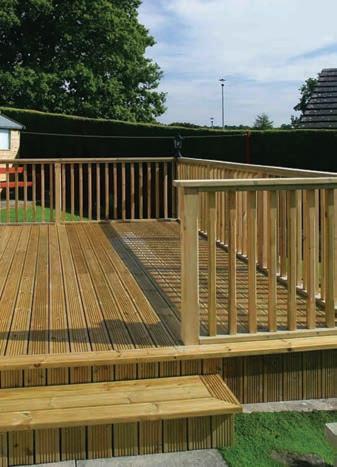



Define your boundaries with style! Explore fencing options that offer privacy, security, and a touch of charm to any outdoor space
F. H. Brundle continues its policy of careful product selection and diversification and has gone from strength to strength – while still maintaining those traditional values first established back in 1889.

Fortitude™
Traditional railings
Price: From £66 (incl. VAT) per metre

• Pre-welded panels for quick and easy installation.
• Adjustable raking panel, up to 40° pitch.
• Corner brackets adjust to 120°.
• Suitable for decking, patios, and balconies.
• Tested to BS 6180. fhbrundle.co.uk

“This is not about cleaning after any damage is done, this is about maintenance: making sure that the lovely wood and structure is protected throughout the year. Good fencing work is a skill, which is why the care, cleaning and maintenance of it is so important. By advising customers well, away from a ‘fast fix’, we can be sure that their quality fencing will remain looking good – with the wood respected and protected for years to come.”
Martin Beaumont, founder of Monty Miracle

Jacksons believes that by designing and manufacturing products for a long service life and backing them with long-term guarantees not only offers customers lower lifetime costs but also benefits the environment.
Jaksun™ Solar Fence Panel
Price: £325.10 (incl. VAT) per panel
• All timber used is Jakcure® treated softwood guaranteed for 25 years.

• 425 watt capability per panel.
• The solar component integrated into the fence is MCS certified.
• Stainless steel fixings are used throughout for longer life.
• Ideal for eco-conscious homes and Passivhaus developments. jacksons-fencing.co.uk
Monty Miracle© is a new, outdoor, hard surface cleaning solution. Offering results in under 10 minutes, without the need for scrubbing or jet washing.

Talasey brings you more than just product solutions, but also a network of supply chain partners. The team offers dedicated and knowledgeable support, which extends through its Designer & Installer Network.

Piranha Slatted Composite Fencing
Price: £250 - £300 (incl. VAT) per panel
• Fencing panels can be retrofitted into existing concrete posts.
• Slatted boards can be installed both vertically and horizontally.


• Made from a mixture of hardwood timber, recycled HDPE plastic materials and additives. Slatted fencing supplied by Talasey –who are FSC® certified (FSC-C154335). The best of both worlds: the natural look of wood with the low maintenance and durability of a composite material. talasey.co.uk

Monty Miracle© Price: £33 (incl. VAT)
• Easy to apply.
• Quick to work – 10 minutes.
• No need to power wash.
• Neutralised and biodegradable, so can it be hosed off onto the wet grass or soil safely.
• Proven to eliminate black spot, algae, lichen and other organic stains on most external hard surfaces, such as stone, wood, plastic, concrete and coated metals. montymiracle.co.uk

We caught up with Mitie’s head of fleet Chris Cubberly, about the company’s steadfast transition to EVs and why he thinks ‘charge anxiety’
may be what’s putting others off from making the switch
Is there room for brand loyalty in the switch to EVs?
“We’re not wedded to one brand of vehicle, but have built strategic partnerships with multiple manufacturers and choose these based on the best fit for our business requirements. We operate a wide range of electric cars, vans, and even a commercial gritter. We’re continuously reviewing our fleet and are investing in a significant number of electric vehicles (EVs) that cater to our colleagues’ needs. For example, in 2023 we introduced 650 converted Volkswagen ID Buzz Cargo vans, and have since ordered more – with a long range, large storage space and comfortable interior, these vehicles are a great solution for many of our drivers.”
“Diverse fleets require creative solutions, every business has its own unique vehicle requirements and unfortunately the electric options available don’t always fit the bill of what’s needed. We’ve experienced this first hand, having a diverse range of needs ourselves – from those driving long distances, to nimble campus-based vehicles, or vans carrying heavy loads – meaning sometimes we need to find our own solutions.


“We used this approach when switching the landscaping vans we use in cities to zero emissions alternatives, where we completely redesigned them to be more sustainable. This included installing a bespoke interior to replace plastic bags with reusable waste collection bags, in addition to fitting solar panels on the roof which are used to charge up battery-powered landscaping tools and equipment such as electric trimmers, leaf blowers and lawn mowers while out on the road. Our landscape business is also the first to operate the UK’s fully electric gritting vehicle, Gritter Thunberg.”
Do you get sufficient mileage in a single charge?
“The range of our EVs varies depending on the vehicle type, the most important consideration for us is choosing an option that works for the requirements of our drivers. For our electric cars we almost always look for options that achieve a minimum range of 300 miles, but for our vans we look at it slightly differently, assessing which option provides the best range possible for the vehicles’ use. It’s certainly not a one-size-fits-all approach.”
What operational changes have been made since transitioning to EVs?
“EVs have become an integral part of our business and sustainability strategy. At Mitie, our fleet accounts for over 90% of our overall scope one and two emissions, meaning

proactively targeting the carbon our vehicles create is crucial to reducing our environmental impact and reaching our Plan Zero commitments (net zero operations by 2025). We‘ve made great strides so far, with over 70% of our fleet now electric.
“Every journey our colleagues make behind the wheel of an EV makes a difference. That’s why we have an EV-first policy, with all colleagues who are granted a company vehicle offered an EV as the default choice. It’s also why EVs are used across our entire estate, from our mobile engineers to our security colleagues and landscapers.”
Does the current charging infrastructure accommodate your needs?
“Whilst we’re proud of the speed and scale of our EV roll-out so far, its success relies heavily on the national infrastructure in place to support widespread adoption. Significant ongoing investment in building more charge points across the UK is essential to support and encourage national EV uptake. While Mitie is installing EV charge points across the country, this ultimately depends on reliable grid connections, which currently there isn’t enough of.
Why do you think people are hesitant to make the switch?
“Range anxiety continues to be a major contributing factor when it comes to getting, and keeping more EVs on the road. Whilst most plug-in cars are able to cover the average commute (28 minutes according to the Department for Transport) without needing to be charged, the cost of public charging and difficulty finding available chargers remain a significant concern for drivers, particularly those driving longer distances.
In fact, the Society of Motor Manufacturers and Traders (SMMT’s) research in 2023 found that two-thirds of drivers see a lack of infrastructure as a key barrier to going electric.”
“From our experience, it’s imperative to put people first to foster a successful EV transition. We offer to install charge points at all our colleagues’ homes where possible, taking away the stress of having to find public charging and continue to encourage driver feedback on how we can make our processes more effective.
Significant ongoing investment in building more charge points across the UK is essential to support and encourage national EV uptake
What more can be done to support those looking to transition to EVs?
“Whilst we continue to reap the rewards of the advancing EV market, the commercial options available regularly don’t meet the ideal range requirements. It would be beneficial for the external market to focus on addressing these gaps. Development of more specialised electric vehicles also needs to be prioritised in order to unlock the next stage of EV adoption, especially within industries such as landscapes and other Heavy Goods Vehicle areas.

“We work with one of the UK’s largest EV charge card partners to enable the cost of public charging to be paid directly by Mitie –meaning colleagues won’t be out of pocket for a work expense. We understand public charging is more expensive and therefore encourage drivers to use home and office charge points where possible. To support this, Mitie has installed charge points at our offices and provided a solution that allows the payment of home energy costs directly to the supplier.”
Anything else to add?
“EV adoption is a vital part of our business strategy. Through partnerships, adaptive infrastructure, and continuous learning, we’re committed to making this transition successful and sustainable. Whilst the journey continues to pose challenges, the benefits far outweigh them, both for the environment and business. As we approach our 6,000th EV, we’re proud to be acknowledged as leading a successful strategic EV transition, and we hope our achievements inspire others to follow.” mitie.com
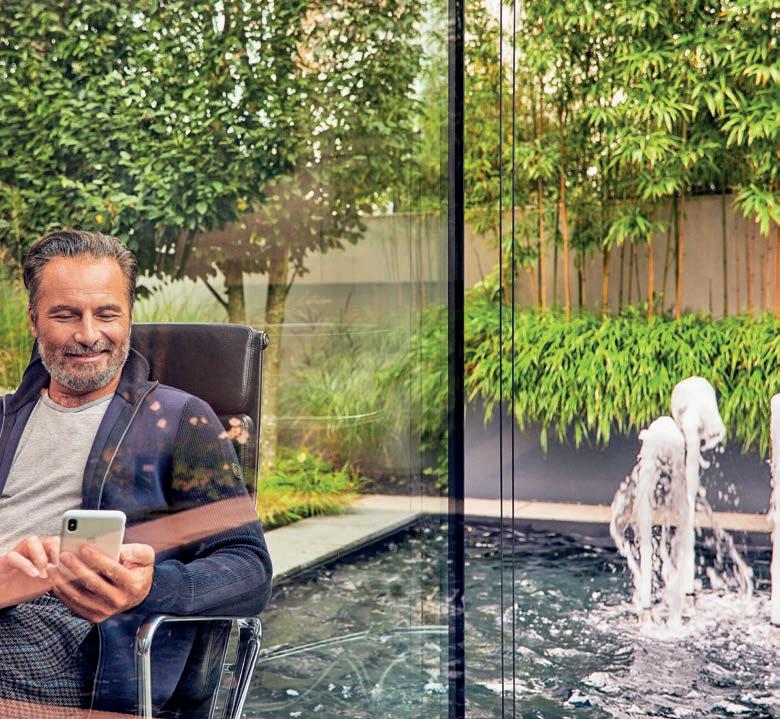
Now you can with OASE Control
The OASE Control app revolutionises water and outdoor management. With a simple press of a button or a voice command via Alexa or Google Assistant, you can manage lights, adjust pump flow rates, change fountain displays and monitor energy consumption.
Whether on site or on the other side of the world – the app allows for easy and convenient control.

Using the OASE FM-Master, up to ten individual OASE Control enabled products can be managed.
Find out which OASE Control products you can add to your next project today.
Discover more at oase.com


“Collaboration

The original all-weather sweep-in jointing compound. Faster than traditional methods.





The ease of the EASYJoint with contemporary colours of grout. For natural & porcelain paving.





















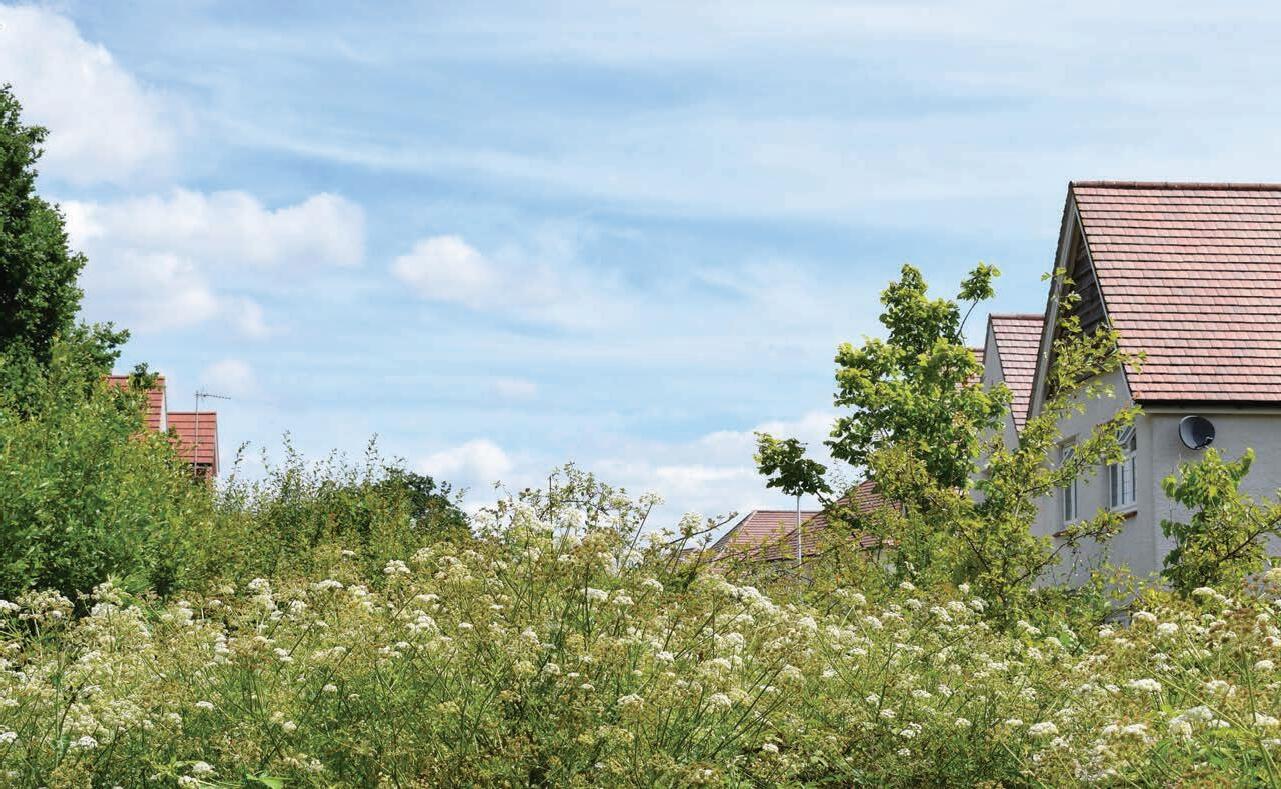
As biodiversity net gain continues to find its footing, the role of private gardens in supporting local wildlife is now under scrutiny
With gardens making up a substantial portion of green space in the UK and the government’s plan to build 1.5 million new homes, the Royal Horticultural Society (RHS) is calling on parliament to amend the current biodiversity net gain metric to include private dwellings; arguing that these personal plots could be key in reversing wildlife decline – sparking a whole new debate in the realm of BNG about the role individual homeowners could have in tackling the biodiversity crisis.
As we grapple with the challenge of enhancing biodiversity, it makes perfect sense to consider what contribution domestic gardens might make
Dave Gallagher, Managing director, Helmrig Ltd
Biodiversity net gain came into effect for large and small developments earlier this year as a way to tackle both the biodiversity and climate crisis. But with its regulations still largely unclear and
substantial loopholes being exploited, its inaugural year has arguably been anything but seamless. If the industry and the government are still coming to grips with the legislation, how can we expect homeowners or renters to willingly introduce it into their privately owned spaces? Managing director of landscaping specialist, Helmrig, Dave Gallagher believes the topic to be a worthy debate, saying: “As we grapple with the challenge of enhancing biodiversity, it makes perfect sense to consider what contribution domestic gardens might make.” That’s not to say he agrees with putting legislation tape on everyone’s gardens, adding: “Personally, I'm not sure I agree with the RHS that we
"While developers are currently required to increase a site’s biodiversity provision by 10%, the measure of success – the biodiversity net gain 4.0 metric – does not account for gardens, nor the estimated 400,000 cultivated plant varieties thought to be found within them, overlooking these as an important tool in tackling environmental and social problems.”
The Royal Horticultural Society
should be looking to regulate our way to better biodiversity in people’s gardens.”

While Joe’s Blooms’ – digital BNG solutions provider – founder and CEO, Oliver Lewis, believes the solution to introducing BNG into gardens lies within creating a system people can trust: “The key thing is to make sure that you have a system which everyone can have confidence in.” Lewis adds that any expansion or change to the legislation needs to be done with the homeowners and renters in the “driver's seat.”
The ornamental debate
In respect to BNG, a site’s biodiversity value is measured in standardised biodiversity units. A single habitat will contain a number of biodiversity units, with its value calculated based on size, quality, location and type. The metric considers how many units will be impacted by the development and then how many are needed to secure the mandatory 10% uplift.
It would be less confusing if we called it habitat net gain, as that is what we are being asked to create
Brian Hawtin, associate landscape architect, Huskisson Brown
Before financial or maintenance responsibility can be discussed, we must first look at what the biodiversity improvements would look like in a residential space. “The reality is that the term biodiversity is misleading, as many landscape architects and garden designers produce biodiverse landscapes that will never count for BNG as they utilise non-native plants which can only be counted as ornamental planting with a low value when recorded in the statutory metric”, shares associate landscape architect at Huskisson Brown, Brian Hawtin. “It would be less confusing if we called it habitat net gain, as that is what we are being asked to create.”
In the same vain, Gallagher believes that for BNG to work in these spaces, a change in garden aesthetic mentality is needed, noting: “We’ll need to change the perception that a beautiful garden consists of a neatly manicured lawn and box hedge, and introduce more biodiversity into our personal preferences – varieties of herbaceous planting, wildflower, greater consideration for wildlife, tolerating the odd bit of deadwood.” Although rewilding itself is not a core focus in the current 4.0 metric, many of the practices


associated with rewilding –the restoration of natural processes and the reintroduction of species – are in line with the objectives of the BNG framework.
“At its heart, this initiative has the desire to contribute to biodiversity net gain utilising the potential biodiverse elements of a garden, which is laudable. The reality is that habitats (as defined by UK Hab and which forms the basis of biodiversity net gain) are untidy, messy and ‘weedy’”, says Hawtin. “The vision of visually pleasing strips of wildflowers buzzing with bees and colourful swathes of perennials and shrubs that provide nectar and shelter do not (and will never) count.
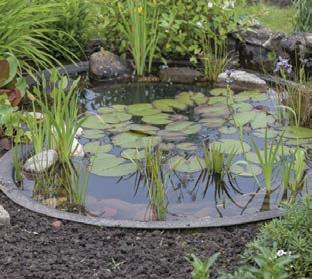
I can’t see many
choosing to encourage nettles, bramble thickets, willow scrub or lowland heath.”
During his talk at FutureScape this year, John Little – founder of the Grass Roof Company –discussed the benefits of a compilation of habitats in close proximity, saying: “Mosaic design is our only hope for increasing biodiversity quick enough.” Little expands on this, adding: “If one person has an all-lawn garden, that doesn’t matter because next door's got shrubs, next door to them has got herbaceous, and next door to them has got a shed with space under it for foxes.” Gardens, much like BNG is not a one size fits all, each space’s requirements are different but also have the potential to uniquely support pocket sized ecosystems, each with different needs.
Simply put by Little: “People's tastes drive biodiversity and biodiversity is driven by people's optimism.” Begging the question,

are gardens which are designed to the taste of the occupants more beneficial to improving biodiversity, as it allows for a compilation of habitats to form off the back of personal preferences?
Whose responsibility is it?
Currently several of the costs associated with BNG fall to developers and local planning authorities, particularly in regards to the mandatory 30-year maintenance requirement. If BNG was to become a legally binding legislation for private spaces, it begs the question; where does the responsibility lie, both for the cost and maintenance of the space? “The word ‘onus’ here exemplifies the misunderstanding that many have with BNG”, says Hawtin. “The requirement is a legal liability to install and maintain to an
In respect to BNG, a site’s biodiversity value is measured in standardised biodiversity units. A single habitat will contain a number of biodiversity units, with its value calculated based on size, quality, location and type. The metric considers how many units will be impacted by the development and then how many are needed to secure the mandatory 10% uplift

private land and private gardens, I think it has to be the homeowner” who should be investing in the space – “they tend to spend money on the garden anyway. This is about encouraging them to spend in a way that considers biodiversity too.”
Lewis adds that “it should be a win-win outcome, one where people invest in nature, but they invest in nature and in a way that works for them and their garden.” This would be the best case scenario for introducing the legislation, but on the flip side, it runs the risk of alienating homeowners and renters against nature, and could be perceived as forcing the legislation into their homes. And while there has been a significant push for transient gardening in recent years, can we truly expect renters to cover these costs? And if not them, then their landlords, which could then be reflected in the price of renting.
approved specification. With liability comes legally defined responsibility and ultimately penalty if you do not meet that responsibility.”
People's tastes drive biodiversity and biodiversity is driven by people's optimism
John Little, founder, the Grass Roof Company
A pivotal component within the BNG framework is the culture shift it is trying to bring about, says Lewis. “ It is trying to entice developers, those who are involved in changing the land, to invest in nature.” In the same breath he believes that, should the legislation come into effect for private dwellings, “that homeowners and renters are the ones who have to think about it and have to incur those costs.” Gallagher agrees, saying: “In the case of
Then comes the mandatory 30 year maintenance…If the current occupant of the house were to move after the work has been completed, who is then responsible for the maintenance of the space?
Lewis comments: “The government has made a set of adjustments to make it easier for smaller developers to manage maintenance. I think likewise, if you're going to extend it into gardens, there should be another step forward for that.” He goes on to say that offsite units should be considered for this very reason, giving occupants the choice and freedom to choose what fits their situation and needs – “we've got to make [BNG] welcoming and accessible for them.”
Hawtin raises the point of “what happens when the garden passes on with the sale of the house. Would it affect the house price negatively or positively?” The costs and legality
associated with the garden's maintenance could be a potential deterrent for prospective buyers. He thinks “there would need to be a BNG inspector to monitor habitats. This would need to be a qualified ecologist. Currently, there is a huge shortage of ecologists which adds another barrier to this initiative.”
While Gallagher believes there are two possible approaches: “You can try and regulate it. Control and enforce it (in much the same way as we are seeing now, through the Planning System), or you can make the case for it, guide, encourage and cajole homeowners to play along, but ultimately accept that implementing and maintaining BNG in someone’s back garden is going to be a voluntary thing.”
It should be a win-win outcome, one where people invest in nature, but they invest in nature and in a way that works for them and their garden

Hawtin adds that as a country “we have a strong land and home-owning culture. Who are we to tell someone what to plant, where to plant it, and rebuke them if it’s not maintained?”
Dave Gallagher, Managing director, Helmrig Ltd
If the RHS’s initiative was to be implemented, the government’s plans to build 1.5 million homes would bring a significant opportunity to strengthen urban resilience and would be a major step in the right direction
of reversing biodiversity loss, but it ultimately comes down to how it is implemented.
“It would require a new ‘domestic metric’ which would consider non-natives, have a shorter requirement and more clarity on any penalties for failing to meet the legal obligations”, says Hawtin.
Much like the small site metric, Lewis thinks an even smaller metric could be the metaphorical fleet behind delivering BNG into gardens: “From very early on, the government basically said it is important that as many applications as possible fall in
this framework, because if you create broad exemptions, a policy will fall apart.”
So maybe it is not about tightening the reins on garden design or imposing on the utility of a person’s space. It’s instead about weaving a tighter catchment net for these gardens to fall into, in a way that benefits and empowers occupants.
Gallagher is hopeful that “many years down the line, we won’t need regulation anymore, because biodiversity has become embedded into the way we think about our gardens, and developers are doing it not for planning reasons, but because it’s what people want, need and expect.”
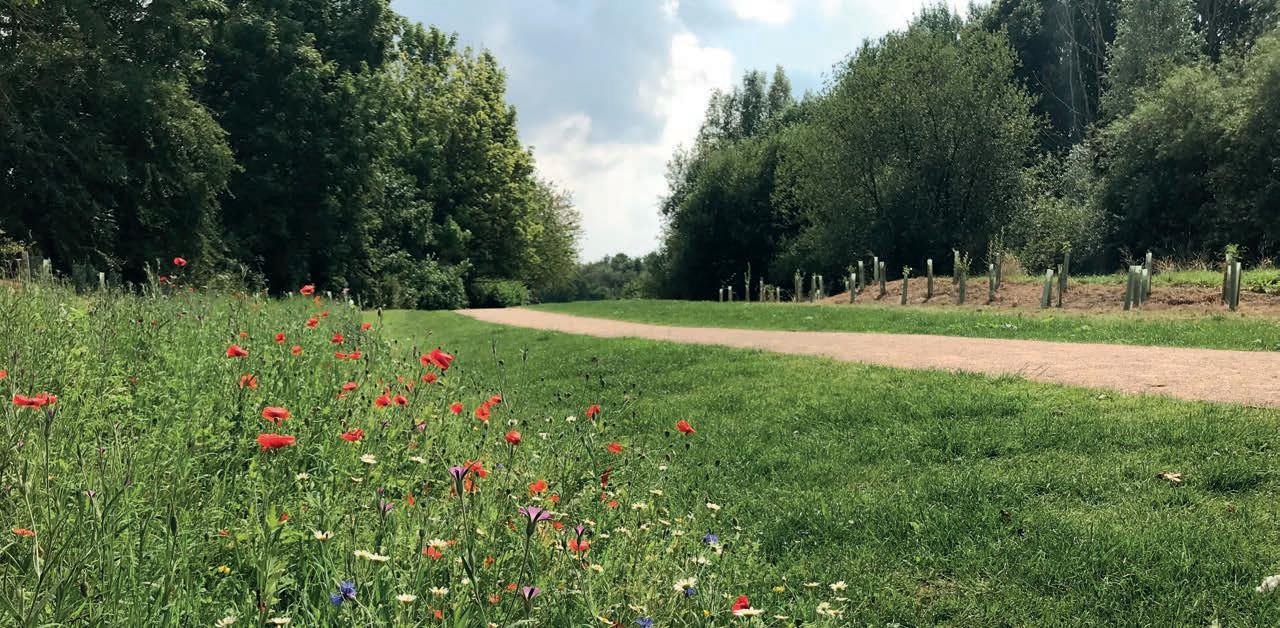


To buy yourself, and your clients, time you could use a pre-grown instant hedge. Practical Instant Hedge™ is available in various species and sizes, up to 2m high.
Evergreen hedges maintain their foliage throughout the year. This provides screening, privacy and shelter all year round.
Deciduous hedges shed their leaves in the winter. They offer year-round seasonal interest from flowers, coloured foliage, or autumn fruits.
Our mature hedge is easy to handle, can be planted all year round with no transplant shock. There are many varieties of Practical Instant Hedge™ that will suit your garden projects.
Tree & Hede Nursery
As well as Practical Instant Hedge™ we have a range of attractive screening trees at the nursery in Iver. You are welcome to visit to view both trees and hedges.
Book a visit or chat to our Horticultural team to find out more.

Contact us for details email hede@pracbrown.co.uk or call 01753 652022 for more information www.pracbrown.co.uk


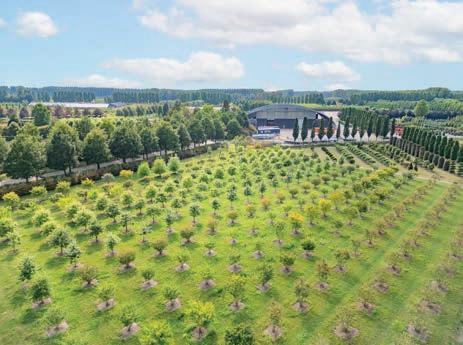
In today’s fast-paced business world, the significance of mentorship has never been more pronounced. When industry leaders gathered at this year’s FutureScape event, the topic of mentoring emerged as a key theme, emphasising its role in shaping the future of our industry.
I had the privilege of participating in a lively speaker panel alongside some of the most influential voices in our industry –Alistair Bayford, Andrew Fisher Tomlin and Mark Gregory – where we shared our personal mentoring journeys, reflecting on how we have sought guidance from mentors throughout our careers and how we find it rewarding to mentor others. Our audience of 30 Under 30: The Next Generation award winners engaged with some thoughtful questions and our host Ross Conquest did a fantastic job of keeping us all on track!
In this piece, I will share my own insights and personal experience of mentoring (both as mentor and mentee), highlighting how effective mentorship accelerates personal development and also creates a culture of teamwork and self-direction. Whether you’re a seasoned leader or in the early years of your career, the power of mentoring can be a great catalyst for your learning and growth.
Mentoring has a wealth of benefits for those receiving it, but also for the mentors themselves, explains James Scott
Mentoring doesn’t need to be formal, although it can be. People can be mentored as part of an everyday work conversation or discussion with industry colleagues
Mentoring is a process where a more experienced person offers advice and guidance to another, aimed at helping them with their learning and development. It’s akin to providing a shortcut, drawing on personal experiences – sharing not only what worked well for the mentor in the past, but also what didn’t, and the lessons learned along the way.
Looking back on my own journey of establishing a business over 30 years ago, I often found myself hitting a ‘wall’ every time I tried to elevate my company. I wish I had possessed the insights I have now! I did get advice and guidance from various people throughout my career, which helped a great deal – and also made me appreciate the role that mentoring can
play. I strongly believe that it accelerates a person’s progression, especially where leadership roles are concerned.
I began mentoring people several years into my role as an owner-manager, linked to developing other leaders within The Garden Company. I needed my team leaders to grow their confidence and competence so that they could run larger projects independently. Mentoring was a vitally important tool I used to achieve this.
I think it’s useful to note that mentoring doesn’t need to be formal, although it can be. People can be mentored as part of an everyday work conversation or discussion with industry colleagues. They might not recognise these interactions as mentoring, but the benefits are still apparent.
relationship between mentoring and leadership
Mentoring and leadership are closely linked, though leadership is a broader term; it is about letting people know what is expected of them and how they are performing against that expectation. It’s also about being a role model; for example, addressing substandard practices straightaway rather than letting them become the ‘new norm’.
In my view, mentoring is a leadership tool to grow peoples’ capabilities (alongside coaching, training and instructing). It’s more personalised than general leadership, being tailored to the specific needs of the mentee. For it to be effective, it must consider the mentee’s willingness and ability to grow. It’s also a two-way thing; both parties need to be genuinely invested in the process and aiming for a positive outcome.
Mentoring in-house
As soon as new starters join The Garden Company, we focus on getting them up to speed with our ways of working. This includes guiding them through our Standard Operating Procedures and – importantly – immersing them in all aspects of the job. This is how I approach onboarding a new team leader and it is how I expect my team leaders to approach onboarding new team members. We may not always refer to this as mentoring, but my team leaders know they need to dedicate time into sharing their expertise with their team members – it’s laid out in their job description as a key responsibility. I take pride in witnessing individuals transition from entry-level roles to team leaders – and even beyond, with some establishing their own businesses or securing senior positions elsewhere. Knowing that The Garden Company has provided a solid foundation for their growth is very rewarding.
Mentoring externally
I love our industry, and it has served me very well over the years. However, being a business owner can be quite a lonely place to be, and both BALI and the SGD have helped me enormously over the years not to be too isolated. Through both organisations, I have made useful contacts, built up a network and learnt from other people facing similar challenges. This includes very useful conversations with Mark Gregory and the late, great John O’Conner at North Thames BALI meetings in years gone by. Throughout the latter half of my career, I’ve gained huge satisfaction from ‘giving back’ to our industry through my involvement with both BALI and the SGD, sometimes in a mentoring capacity. Currently, I serve on the SGD accreditation panel, mentoring individual designers by reviewing their work and providing constructive feedback to help accelerate their progression. I also contribute to our industry by serving on the judging panels for the SGD Awards and Pro Landscaper Project Awards.
Simply having the mindset to be as helpful as you can when you meet more junior people is likely to lead to mentoring connections
I create the time to take part in such activities by prioritising them in my diary and delegating tasks to my team leaders. I am proud of the self-directed culture we have in place at The Garden Company; one of its main implications is that I can spend time focussing outward, confident that my team leaders can handle decisions and solve problems themselves. They are willing and able to work like this because of our mentoring relationship.
Advice to those seeking to be mentored or to mentor others
If you’re keen to benefit from some mentoring, you may be able to arrange this in-house with someone you respect and trust – a line manager or senior colleague. If in-house options are limited or not available, I highly recommend immersing yourself in one or two industry trade associations or societies. In design, landscaping and horticulture, you’ll find lots of people who are more than happy to share their wisdom and advice –seriously, it’s like a treasure trove of guidance! Whether you are looking for a quick chat or a long-term mentoring relationship, there’s absolutely no need to wrestle with your work dilemmas alone. There are some formal mentoring opportunities available too; for example, the
SGD offers a group mentoring programme with selected mentors, who provide five group sessions covering a variety of topics. And if you’re interested in giving back and mentoring others, then again – look at ways to do so within your own organisation or actively engage with trade associations and societies to identify suitable mentoring opportunities. Simply having the mindset to be as helpful as you can when you meet more junior people is likely to lead to mentoring connections too.
I see mentoring as a crucial leadership tool, and this was reinforced by the recent panel discussion with fellow industry colleagues and our audience at FutureScape. Mentoring provides personalised guidance, fosters career growth and contributes to business success. It does so by facilitating knowledge transfer and developing leadership talent. Mentoring has benefited me personally throughout my career and I trust it will continue to play a pivotal part in shaping the next generation of leaders.

JAMES SCOTT
James Scott (FSGD MBALI) founded design-andbuild business The Garden Company in Hertfordshire in 1991. He has received multiple national awards, serves as a judge for the SGD Awards and the Pro Landscaper Project Awards and belongs to the SGD accreditation panel. In 2022, Pro Landscaper named him as one of the Top 25 Most Influential figures in the industry. thegardenco.co.uk
In my new role as climate change awareness ambassador, I find myself needing to find ways of making complex issues easy to relate to. Down the years I have used many similes and comparisons to get my messages across concerning climate change, with varying degrees of success. However, I recently stumbled, by chance, across what I believe to be a really good metaphor for climate change and, like all good metaphors, it uses something that most can relate to.
So, my metaphor of choice is the comic character Desperate Dan. Now, Dan was one of the characters in that memorable comic The Dandy, read along with its competitor The Beano by just about every child of the 50s through to the 70s. Of course, its rather raw and sometimes unintentionally cruel humour has no place in today’s world; but for a couple of generations, it was our schooling, our amusement and our moral compass. Even if you never read the Dandy Dan, it is still a familiar figure.
For those who haven’t come across Dan before, he was what you might call today a big lad, and he had a humongous (and probably a very unhealthy) appetite. Dan’s meal of choice was cow pie, a dish which contained an entire cow, horns included, and he would consume one of these at each sitting. This was the biggest pie imaginable; it could get no bigger as there was neither the dish to contain it, the cooks to prepare it, or the money to buy it.
Although this never happened in the Dandy comic, I sketch out this scenario for attendees to my lectures. Dan meets a pretty girl and, after dating, they get married. Dan’s new wife has to eat. So, Dan has to share his pie; but no worries, the new Mrs Dan says: “It’s alright Dan, I only need a small piece as I’m on a diet.” So, Dan is happy because he has a pretty wife, and he still gets to eat nearly all his pie.

Chris Churchman uses an old comic book tale of greed and gluttony to explain how net zero could be met
minority lucky enough to be citizens of a rich country. However, what happens when those poor nations become more prosperous and their populations more numerous, as is happening in all the developed nations? India, parts of Asia, Africa, and parts of South America?
Inevitably, they place an ever-increasing pressure on global resources. and those of us fortunate enough to have enjoyed a bigger slice of the pie in the past cannot deny them their fair share now. So, better sharing is the only solution.
Net zero is not the aim of one person, one sector of an economy, or even one country; net zero only works when applied to the entire planet
Net zero is a state of balance: emissions balanced by absorption. Increasing demand for all resources, and increasing greenhouse gas emissions, is not sustainable – we all know this. Net zero is not the aim of one person, one sector of an economy, or even one country; net zero only works when applied to the entire planet. So, inevitably, if growing countries with expanding appetites demand a bigger slice of the pie, the historic superpowers – and that means us – will have to consume less.
Then they have a family: five children, three boys. At first, this is not a problem; the children are only tiny and have very small appetites. But as the children grow, so inevitably do their appetites and, as they become strapping lads and girls, they want as much pie as dad. There is only one answer: the pie must be shared equally.
The metaphor here is that our world has finite resources, which we all need to exploit. Whilst you have superpower countries and poor nations, the lion’s share of those resources is enjoyed by the
In short, there is only one pie, and there is only one planet! So, we have to achieve the same with less.

CHRIS CHURCHMAN
Chris Churchman is the founder of cquester, a not-forprofit venture seeking to raise awareness of the value of nature in addressing climate change. cquester.co.uk

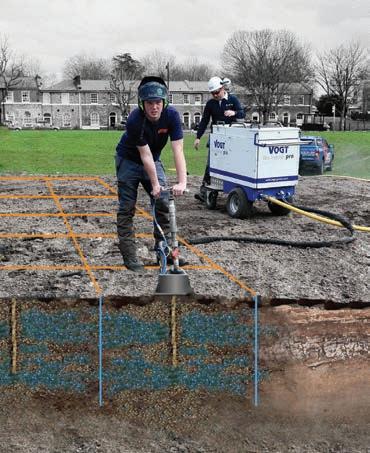
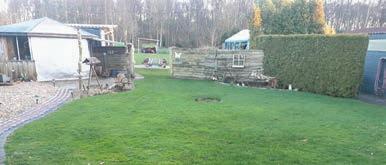











CIS Street Furniture offer a diverse range of street furniture which will complement any
As a result of the built environment compaction can inhibit or prevent natural root growth of trees. CIS SUDs compliant resin bound tree grilles are a great way of enhancing the sustainability of your project for future generations. Find out more at our website below.
Tel: 01483 203388 www.cis-streetfurniture.co.uk

























Has sustainability become a greenwash staple, wonders Peter Reader
Wandering around the autumn landscape trade shows, it is exciting to see so many new products; but equally striking is how many of them strive to shoehorn the claim of sustainability into their product’s key selling points. A welcome sign of our new awareness of our planet’s ecological fragility and the challenge of climate change, you might think. It is heartwarming, isn’t it, when feeling so overwhelmed by the enormity of the climate challenge, to feel that our industry is solving the problems for us. Is this truly the case, or are we being gently greenwashed into a false sense of security?
Sadly, for the planet (and us), I believe it is the latter. In her fascinating and disturbing book, ‘This Changes Everything – Capitalism vs the Climate’ by Naomi Klein, the author challenges the modern perceptions of how the world needs to operate to reverse global warming and prevent a climate catastrophe.
One of her key arguments is that we have let industry and ‘The Market’ take over the thinking and levers of how we address these problems. They have lulled us into a belief that only they can solve these challenges. She points out that most of the greatest steps forward in improving the ecological health of our planet have come from government legislation and cites key examples such as the Clean Air Acts of 1956 and 1968 which eradicated the London smog of that time. Such statutory instruments have become increasingly sidelined and labelled as ‘red tape’ or the ‘nanny state’, led by those who would have us believe ‘The Market’ will have all the answers. Regulation has become a dirty word, instead of the protector of the poor and the environment.
Regulation has become a dirty word, instead of the protector of the poor and the environment
The fossil fuel industry is perhaps the best-known example of this, hijacking the agenda and dressing up ‘The Market’ as supporting the green cause, whilst also investing millions in undermining the scientific evidence that their products are the cause of global warming. Through this clever manoeuvring and political lobbying, companies have
positioned themselves to be seen as key players at critical meetings to address the problem. Perhaps the most well-known example was COP 28 which was hosted by Sultan Ahmed Al Jaber, chair of Abu Dhabi National Oil Company, the state-owned oil company of the United Arab Emirates and the world’s 12th largest oil company. Such companies are also allowed to send vast numbers of representatives to the COP summits, when some of the poorest and most at-risk countries can barely afford to send a handful of representatives. In my previous career as a medic, we would have called this out as a preposterous conflict of interests.
So, what does all this anti-capitalist ranting have to do with attending a trade show then, I hear you ask. Well –quite a lot actually. Sadly, this belief in ‘The Market’ as the only way to problem-solve in this world has become so ingrained in our DNA that we don’t see the power it holds over us and how it controls and blinkers our thinking. At the hustings for the next Conservative leader in 2022, two of Rishi Sunak’s key pillars for fighting climate change were recycling (more on that later) and ‘innovation’. By innovation, he was referring to industrial technologies like removing CO2 from the atmosphere: a dream, like Fusion Power, which is (and has always) been 30 years away. There are already plenty of technologies that can help prevent global warming, but it is ‘The Market’s’ control of our and our leaders’ thinking that prevents them being deployed at pace and keeps us locked into their profitable, fossil fuel-based energy sources.
order to lay the sub-base, and of course the sub-base is a lot less permeable than lawn-covered soil, so perhaps that run-off will still be a problem. Sadly, the plastic grass will still get hot, and it won’t support a host of insects and other animals, nor will the MOT underneath.
The true solution to our plastic-waste epidemic is to use less or no plastic all, particularly in cases like lawns, where we don’t need to use it in the first place
So, coming back to our pleasant afternoon at the trade show: it is important that we shake off the blinkers and apply critical thinking to these wonderful sustainable products we are being sold. A classic example of this (and sorry – it is an easy target) is that of artificial turf. There are several companies now happy to supply us with the nirvana of recyclable artificial turf. Not only is it recyclable, but because of its lack of a thick backing, it is much more permeable than the older products. At last, we no longer need to feel guilty about landfill and run-off flooding the neighbours’ gardens, as ‘The Market’ has solved our problems when clients insist on using it. But wait, don’t get too carried away. Look beneath the marketing greenwash and think critically; their solution is actually no solution at all. You will still need to remove over 100mm of living, CO2– absorbing soil to landfill in
And as for being recycled? Well, let’s look at that one. Sadly, much of our widely lauded recycling is the ultimate greenwash, particularly in the case of plastics. Currently, 430 million tons of plastic is produced worldwide each year (UN Environmental Programme), more than the entire weight of all the human beings on the planet. In the UK, according to The Big Plastic Count, 58% of our plastics are incinerated (generating fossil-based CO2), 11% goes to landfill, 14% is exported (dumped on poorer counties) and only a paltry 17% is recycled. Another recent study (Everyday Plastic Social Enterprise Report) estimated that 70% of all plastic bags returned to Tesco and Sainsbury's for recycling are burnt. The true solution to our plastic-waste epidemic is to use less or no plastic all, particularly in cases like lawns, where we don’t need to use it in the first place.
Returning briefly to Naomi Klein’s point about legislation being cleverly undermined, I would also like to remind you that the Welsh Government’s plans to ban artificial turf and plans to require planning permission for its use in England have both been abandoned. In both instances, industry lobbying and concerns about a disproportionate use of ‘red tape’ played significant roles.
So, please don’t get caught up in ‘The Market’ greenwash we are all programmed to believe in. We have all become infused with the capitalist mantra that ‘The Market’ is the only way forward and will provide all the solutions; but please, stand back, think hard and think laterally and then challenge the rhetoric.

Peter Reader left the NHS after 25 years as a GP to follow his passion for nature, gardening and design. He retrained at KLC School of Design, and immediately set up his single-handed North London design practice Peter Reader Landscapes in 2013. He designs mostly private gardens in the South East and has received awards for his work from the RHS, BALI, and Houzz. readerlandscapes.com
Off the back of winning Pro Landscaper’s Sustainability & Biodiversity Leadership award, Tyler Grange’s quality data & B Corp lead, Kay Geoghegan delves into how she ensures the B Corp consultancy remains at the forefront of sustainability stewardship
What does your current role entail on a day to day?
My role varies throughout the year and is largely project-driven, ranging from B Corp research and improvements to environmental management and carbon reduction strategies, and quality management to internal and external audit prep, as well as key accreditations, certifications, and framework updates.
How did you come to take point on Tyler Grange’s sustainability journey?
B Corp business case. I enjoyed learning about it so much, I asked if I could project manage the certification process. I think they were secretly hoping that I would!
B Corp provided the framework to track our performance and enabled us to be part of a global community working together to make a real, positive change
What sparked the ambition to become B Corp certified?
Our managing director, Jon Berry, saw an article on Innocent Drinks’ B Corp certification, back in 2018, and it struck a chord with him.

Tyler Grange has long planned its sustainability journey and B Corp certification – it’s a very natural fit for our values and ethics – however, in the early days, there wasn’t anyone in the business who knew how to implement it.

My previous role within the business already kept me busy, so we invited an intern, from the University of Exeter, to work alongside me for two months – collating background information to inform our
Tyler Grange had always wanted to put people and the planet at the heart of everything, by conducting business in a non-corporate way, and B Corp provided the framework to track our performance and enabled us to be part of a global community working together to make a real, positive change.
How do you ensure the company remains at the forefront of environmental stewardship?
Learning about how Tyler Grange can remain at the forefront of environmental stewardship is my absolute passion; I actively seek out key webinars and training resources, upskilling at every opportunity. I enjoy researching where we can adopt strategies to improve our business, and networking with like-minded people is great fun and very rewarding.
I’ve been invited to co-chair the newly formed Gloucestershire B Local group to help spread the word and encourage others; signposting to tips, organisations
and resources. Our collective aim is to connect like-minded companies and promote social and environmental responsibility in business across the county. 2025 will see the 10th anniversary of the B Corp movement –with over 2,300 UK B Corps and 150,000 people in the UK working for a B Corp, and over 9,200 global B Corps across 105 countries with almost 880,000 workers.
What advice would you pass on?
Create your B Impact Assessment account sooner rather than later. It’s always better to be ahead of curve when adopting the changes you want. B Corp aligns with our disciplines and the people who work in this industry and, by looking at the requirements, it’s easy to see whether it is achievable for you to undertake the certification yourself or consider professional support to guide you.
CONTACT
Tyler Grange
Email: bcorp@tylergrange.co.uk
Phone: 0121 828 4043 tylergrange.co.uk
